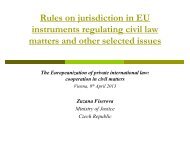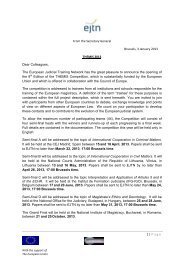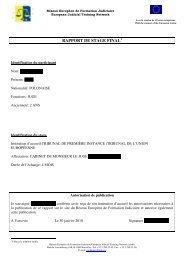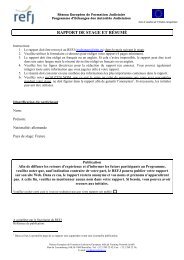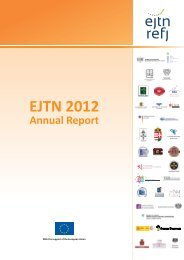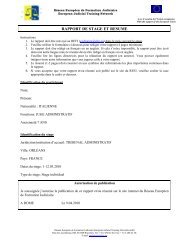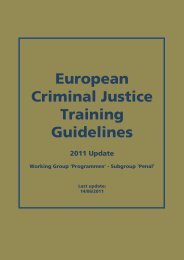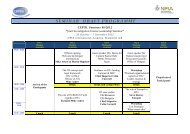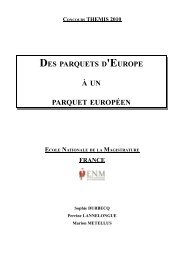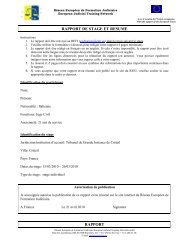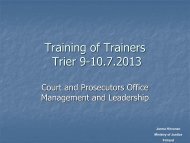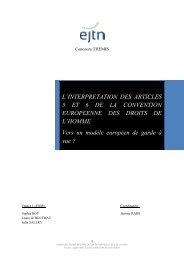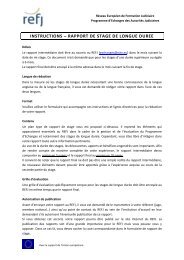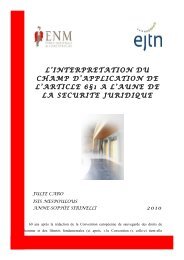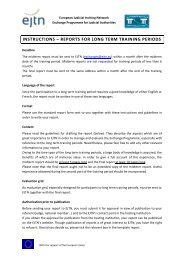Annual Report of the Office of the Head of ... - EJTN Website
Annual Report of the Office of the Head of ... - EJTN Website
Annual Report of the Office of the Head of ... - EJTN Website
Create successful ePaper yourself
Turn your PDF publications into a flip-book with our unique Google optimized e-Paper software.
<strong>Annual</strong> <strong>Report</strong> <strong>of</strong> <strong>the</strong> Ofce <strong>of</strong><br />
<strong>the</strong> <strong>Head</strong> <strong>of</strong> International Family<br />
Justice for England and Wales<br />
1st January-31st December 2011
<strong>Annual</strong> report <strong>of</strong> <strong>the</strong> <strong>Office</strong> <strong>of</strong> <strong>the</strong> <strong>Head</strong> <strong>of</strong> International Family Justice for England and Wales Contents<br />
Contents<br />
Preface iii<br />
Introduction<br />
Chapter 1 – Developments in 2011<br />
1.1 Brief background<br />
1.2 The Sixth Meeting <strong>of</strong> <strong>the</strong> Special Commission in The Hague<br />
1.2.1 Cross-border mediation<br />
1.2.2 Relocation<br />
1.2.3 Direct judicial communications<br />
1.2.4 Domestic violence and Article 13(1)(b)<br />
Chapter 2 – The legal framework<br />
2.1 The 1980 Hague Convention on <strong>the</strong> Civil Aspects on International Child<br />
Abduction<br />
2.2 The 1996 Hague Convention on <strong>the</strong> International Protection <strong>of</strong> Children<br />
2.3 The 2007 Hague Convention on Maintenance<br />
2.4 Council Regulation (EC) 2201/2003 (Brussels II bis)<br />
2.5 Council Regulation (EC) No 4/2009 (Maintenance Regulation)<br />
2.6 The Child Abduction Act 1985<br />
2.7 Implementation <strong>of</strong> <strong>the</strong> 1996 Convention<br />
2.8 Implementation <strong>of</strong> <strong>the</strong> 2007 Convention<br />
Chapter 3 – The role and activities <strong>of</strong> <strong>the</strong> <strong>Office</strong><br />
3.1 Liaison<br />
3.2 General enquiries<br />
v<br />
1<br />
4<br />
7<br />
i
Contents<br />
3.3 Association <strong>of</strong> International Family Judges<br />
3.4 <strong>Annual</strong> International Family Law Lecture<br />
3.5 Relocation research<br />
3.6 Best Practice Guide on <strong>the</strong> Application for <strong>the</strong> Return <strong>of</strong> <strong>the</strong> Child under<br />
Article 11 <strong>of</strong> Council Regulation (EC) 2201/2003<br />
3.7 Working Group on Mediation in International Child Abduction Proceedings<br />
3.8 Judicial visits to <strong>the</strong> jurisdiction<br />
3.9 Conferences<br />
Chapter 4 – Cases and General Enquires handled by <strong>the</strong> <strong>Office</strong><br />
4.3 International case log<br />
4.2 Regional statistical summaries<br />
4.2.1 Europe<br />
4.2.2 Asia<br />
4.2.3 Africa<br />
4.2.4 Central and South America and <strong>the</strong> Caribbean<br />
4.2.5 Australasia<br />
4.2.6 North America<br />
4.3 Internal requests<br />
4.3.1 Case studies<br />
4.4 External requests<br />
4.4.1 Case studies<br />
4.5 General enquiries<br />
4.6 Conferences and international meetings<br />
Chapter 5 – Staff 34<br />
Chapter 6 – Finances<br />
Chapter 7 – Articles and Papers written by <strong>the</strong> <strong>Office</strong><br />
11<br />
35<br />
36
<strong>Annual</strong> report <strong>of</strong> <strong>the</strong> <strong>Office</strong> <strong>of</strong> <strong>the</strong> <strong>Head</strong> <strong>of</strong> International Family Justice for England and Wales Preface<br />
Preface<br />
This is a report on <strong>the</strong> activities <strong>of</strong> <strong>the</strong> Ofce <strong>of</strong> <strong>the</strong><br />
<strong>Head</strong> <strong>of</strong> International Family Justice for England and<br />
Wales (hereinafter “<strong>the</strong> Ofce”) from 1st January<br />
2011 to 31st December 2011.<br />
The Ofce functions as a centre <strong>of</strong> expertise and a<br />
help desk for general enquiries in <strong>the</strong> feld <strong>of</strong><br />
international family law for <strong>the</strong> judiciary and<br />
practitioners in this jurisdiction and overseas. Its role<br />
is to support cross border judicial collaboration and<br />
to enhance <strong>the</strong> expertise necessary for handling <strong>the</strong><br />
large number <strong>of</strong> cases relating to aspects <strong>of</strong> private<br />
international law.<br />
Year on year <strong>the</strong> Ofce has seen a signifcant rise in<br />
<strong>the</strong> number <strong>of</strong> requests for its liaison function, i.e.<br />
requests to establish judicial communications<br />
between an English court and a foreign court.<br />
It has also seen a rise in <strong>the</strong> number <strong>of</strong> general<br />
enquiries, i.e. handling <strong>of</strong> requests for advice from <strong>the</strong><br />
Family Division judges and enquiries from academics,<br />
<strong>the</strong> Ministry <strong>of</strong> Justice and foreign Ministries, <strong>the</strong><br />
Central Authority, Foreign and Commonwealth<br />
Ofce, and charitable organisations.<br />
This may, in part, be as a result <strong>of</strong> <strong>the</strong> continuing<br />
growth in international family litigation. 65% <strong>of</strong><br />
children born in London in 2010 had at least one<br />
foreign parent 1 .These fgures illustrate <strong>the</strong> potential<br />
for signifcant future growth in international family<br />
litigation.<br />
We both attend national and international<br />
conferences and meetings and give lectures.The year<br />
2011 was an important one for <strong>the</strong> Ofce. In<br />
addition to <strong>the</strong> large number <strong>of</strong> cases and enquiries<br />
referred to <strong>the</strong> Ofce, we both attended <strong>the</strong> Sixth<br />
Meeting <strong>of</strong> <strong>the</strong> Special Commission to review <strong>the</strong><br />
practical operation <strong>of</strong> <strong>the</strong> Hague Convention <strong>of</strong> 25<br />
October 1980 on <strong>the</strong> Civil Aspects <strong>of</strong> International<br />
Child Abduction (hereinafter “<strong>the</strong> 1980<br />
Convention”) and <strong>the</strong> Hague Convention <strong>of</strong> 19<br />
October 1996 on Jurisdiction,Applicable Law,<br />
Recognition, Enforcement and Co-operation in<br />
respect <strong>of</strong> Parental Responsibility and Measures for<br />
<strong>the</strong> Protection <strong>of</strong> Children (hereinafter “<strong>the</strong> 1996<br />
Convention”) which was staged at <strong>the</strong> Peace Palace<br />
in The Hague.<br />
Three and a half weeks 2 were spent debating a wide<br />
range <strong>of</strong> issues, <strong>the</strong> product <strong>of</strong> which will go to <strong>the</strong><br />
General Afairs Committee in April 2012.<br />
The year 2011 has also seen signifcant development<br />
in child abduction case law, for example <strong>the</strong> Supreme<br />
Court decision in E (Children) [2011] UKSC 27 and<br />
<strong>the</strong> judgments <strong>of</strong> <strong>the</strong> European Court <strong>of</strong> Human<br />
Rights (hereinafter “<strong>the</strong> ECtHR”) which sparked it.<br />
The co-operation between <strong>the</strong> Family Courts, <strong>the</strong><br />
Central Authority and <strong>the</strong> lawyers working in <strong>the</strong><br />
area <strong>of</strong> international child abduction, relocation and<br />
cross-border care cases, which all form part <strong>of</strong> <strong>the</strong><br />
child protection chain, has proved to be successful<br />
again in 2011, thus contributing to <strong>the</strong> quality and<br />
smooth-running <strong>of</strong> <strong>the</strong>se proceedings.<br />
However, <strong>the</strong>re is still much work to be done;<br />
Pr<strong>of</strong>essor Nigel Lowe’s statistical analysis <strong>of</strong><br />
applications made in 2008 under <strong>the</strong> 1980<br />
Convention highlight <strong>the</strong> <strong>of</strong>ten unforgivable delays in<br />
1. <strong>Office</strong> for National Statistics.<br />
2. The Sixth Special Commission took place between <strong>the</strong> 1st June and 10th June 2011 and 25th January and 31st<br />
January 2012.<br />
iii
Preface <strong>Annual</strong> report <strong>of</strong> <strong>the</strong> <strong>Office</strong> <strong>of</strong> <strong>the</strong> <strong>Head</strong> <strong>of</strong> International Family Justice for England and Wales<br />
Hague Convention cases.Where judgment should be<br />
issued within 6 weeks 3 it takes on average 165 days<br />
between Brussels II bis States and 215 days where<br />
nei<strong>the</strong>r State was a Brussels II bis State. Only 28% <strong>of</strong><br />
Brussels II bis applications to England and Wales were<br />
resolved in 6 weeks (37 out <strong>of</strong> 130) 4 .<br />
The Rt. Hon. Lord Justice Thorpe<br />
<strong>Head</strong> <strong>of</strong> International Family Justice for England<br />
and Wales<br />
Lord Justice <strong>of</strong> Appeal<br />
Liaison Judge for England and Wales<br />
Royal Courts <strong>of</strong> Justice<br />
We hope that in <strong>the</strong> forthcoming year international<br />
child protection and international child abduction<br />
cases will continue to receive <strong>the</strong> necessary attention.<br />
Miss Victoria Miller<br />
Lawyer to <strong>the</strong> <strong>Head</strong> <strong>of</strong> International Family<br />
Justice for England and Wales<br />
Royal Courts <strong>of</strong> Justice<br />
3. Article 11(3) <strong>of</strong> <strong>the</strong> Brussels II bis Regulation states that, in applying Articles 12 and 13 <strong>of</strong> <strong>the</strong> 1980 Convention, <strong>the</strong><br />
courts must use <strong>the</strong> most expeditious procedures available in national law and that, barring exceptional circumstances,<br />
issue judgment within 6 weeks.<br />
4. See “A statistical analysis <strong>of</strong> Applications made in 2008 under <strong>the</strong> Hague Convention <strong>of</strong> 25 October 1980 on <strong>the</strong> Civil<br />
Aspects <strong>of</strong> International Child Abduction, Part II, Regional <strong>Report</strong>”, Prel. Doc. No 8 B <strong>of</strong> May 2011, drawn up by<br />
Pr<strong>of</strong>essor Nigel Lowe, Cardiff University Law School (hereinafter “Pr<strong>of</strong>essor Nigel Lowe’s Statistical Analysis”). Available<br />
on <strong>the</strong> Hague Conference website at < www.hcch.net > under “Child Abduction Section” <strong>the</strong>n “Special Commission<br />
meetings on <strong>the</strong> practical operation <strong>of</strong> <strong>the</strong> Convention” and “Preliminary Documents / Information Documents”.<br />
iv
<strong>Annual</strong> report <strong>of</strong> <strong>the</strong> <strong>Office</strong> <strong>of</strong> <strong>the</strong> <strong>Head</strong> <strong>of</strong> International Family Justice for England and Wales Introduction<br />
Introduction<br />
Since its creation in April 2005 <strong>the</strong> Ofce has<br />
delivered both <strong>the</strong> objectives <strong>of</strong> <strong>the</strong> <strong>Head</strong> <strong>of</strong><br />
International Family Justice and a service to judges<br />
and practitioners both within <strong>the</strong> jurisdiction and in<br />
o<strong>the</strong>r jurisdictions transiently troubled by a pending<br />
case with an English dimension.<br />
The recent developments over <strong>the</strong> period covered by<br />
<strong>the</strong> report will be discussed in Chapter 1. Chapter 2<br />
sets out <strong>the</strong> legal framework, while Chapter 3<br />
addresses <strong>the</strong> Ofce’s duties and functions. Chapter 4<br />
provides a statistical analysis <strong>of</strong> <strong>the</strong> cases that <strong>the</strong><br />
Ofce dealt with, including liaison requests and<br />
general enquiries.This chapter also lists <strong>the</strong><br />
conferences and international meetings attended by<br />
<strong>the</strong> <strong>Head</strong> <strong>of</strong> International Family Justice and <strong>the</strong><br />
Ofce lawyer during <strong>the</strong> period covered by <strong>the</strong><br />
report. Personal data and fnances are dealt with in<br />
Chapters 5 and 6 and, fnally, a bibliography <strong>of</strong><br />
articles and papers written by <strong>the</strong> Ofce is provided<br />
in Chapter 7.<br />
v
Chapter One<br />
1. Developments in 2011<br />
1.1 A brief background<br />
The Ofce was established in 2005 when Lord<br />
Justice Thorpe was appointed <strong>Head</strong> <strong>of</strong> International<br />
Family Justice jointly by <strong>the</strong> Lord Chief Justice and<br />
Lord Chancellor to deal with <strong>the</strong> steady and<br />
continuing growth <strong>of</strong> international family litigation<br />
and its consequent demands.<br />
Lord Justice Thorpe is also <strong>the</strong> vice-president <strong>of</strong> <strong>the</strong><br />
Family Division, a senior Court <strong>of</strong> Appeal Judge,<br />
nominated network Judge for <strong>the</strong> purposes <strong>of</strong> <strong>the</strong><br />
International Hague Network <strong>of</strong> Judges (hereinafter<br />
“<strong>the</strong> IHNJ”) for <strong>the</strong> Hague Conventions, nominated<br />
network Judge for <strong>the</strong> purposes <strong>of</strong> <strong>the</strong> European<br />
Judicial Network (<strong>of</strong> Family Law Judges) (hereinafter<br />
“<strong>the</strong> EJN”) and Chairman <strong>of</strong> <strong>the</strong> Association <strong>of</strong><br />
International Family Law Judges.<br />
The Ofce serves as a contact point for <strong>the</strong> courts in<br />
England and Wales when <strong>the</strong>y hear a case <strong>of</strong><br />
international child abduction or a case involving<br />
aspects <strong>of</strong> international child protection and wish to<br />
consult with a foreign judge, and vice versa where a<br />
foreign judge wishes to consult with a English judge.<br />
In addition, <strong>the</strong> Ofce has developed into a helpdesk<br />
and knowledge centre for English judges who need<br />
information on aspects <strong>of</strong> international child<br />
abduction or international child protection.<br />
As a Hague and European Network Judge, Lord<br />
Justice Thorpe shares with colleagues what he has<br />
learned from international conferences, innovations<br />
or developments in international family law.<br />
Wherever possible we publicise <strong>the</strong> existence and <strong>the</strong><br />
work <strong>of</strong> <strong>the</strong> Ofce. The Ofce frequently produces<br />
written papers both for conferences and published<br />
law journals 5 .The development <strong>of</strong> <strong>the</strong> awareness <strong>of</strong><br />
<strong>the</strong> work <strong>of</strong> <strong>the</strong> Ofce has contributed to <strong>the</strong> rise in<br />
<strong>the</strong> number <strong>of</strong> cases with which we deal.<br />
1.2 The Sixth Special Commission<br />
The 6th Special Commission on <strong>the</strong> practical<br />
operation <strong>of</strong> <strong>the</strong> 1980 and 1996 Hague Conventions<br />
was held in The Hague in June 2011 and January<br />
2012. The UK delegation, led by Stuart Moore<br />
(International Private Law Branch <strong>of</strong> <strong>the</strong> Ministry <strong>of</strong><br />
Justice), comprised Emma Burgess (Ministry <strong>of</strong><br />
Justice Legal Adviser), Lord Justice Thorpe, Lord<br />
Woolman (IHNJ for Scotland), Mr Justice Moylan<br />
and Victoria Miller.The delegation mounted a strong<br />
showing which, as is refected in <strong>the</strong> minutes <strong>of</strong> <strong>the</strong><br />
Commission, supported <strong>the</strong> UK’s position as a leader<br />
in international family law. That leadership has been<br />
crucial in developing greater judicial collaboration<br />
through Hague and European judicial liaison<br />
networks.<br />
The Commissions recommendations were drafted by<br />
<strong>the</strong> Advisory Committee, <strong>of</strong> which Lord Justice<br />
Thorpe was a member, and <strong>the</strong> text provided by <strong>the</strong><br />
Committee was swiftly adopted, almost without<br />
amendment, by <strong>the</strong> Commission at <strong>the</strong> fnal session 6 .<br />
5. See Chapters 4.6 and 7.<br />
6. See “Conclusions and Recommendations adopted by <strong>the</strong> Special Commission on <strong>the</strong> practical operation <strong>of</strong> <strong>the</strong> 1980<br />
and 1996 Hague Conventions (1-10 June 2011)”, and “Conclusions and Recommendations (Part II) adopted by <strong>the</strong><br />
Special Commission on <strong>the</strong> practical operation <strong>of</strong> <strong>the</strong> 1980 and 1996 Hague Conventions (25 – 31 January 2012)”,<br />
drawn up by <strong>the</strong> Permanent Bureau. Available on <strong>the</strong> website <strong>of</strong> <strong>the</strong> Hague Conference at < www.hcch.net > under<br />
“Child Abduction Section” <strong>the</strong>n “Special Commission meetings on <strong>the</strong> practical operation <strong>of</strong> <strong>the</strong> Convention” and<br />
“Conclusions and Recommendations”.<br />
1
<strong>Annual</strong> report <strong>of</strong> <strong>the</strong> <strong>Office</strong> <strong>of</strong> <strong>the</strong> <strong>Head</strong> <strong>of</strong> International Family Justice for England and Wales Chapter One<br />
1.2.1 Guide to Good Practice in Cross-border<br />
Mediation<br />
A guide to good practice, although not binding on<br />
contracting States, has been drawn up by <strong>the</strong><br />
Permanent Bureau and endorsed by <strong>the</strong> 6th Special<br />
Commission 7 .An expert group will be commissioned<br />
to assess <strong>the</strong> jurisdictional problems that arise from a<br />
compromise agreement that extends well beyond <strong>the</strong><br />
immediate issue <strong>of</strong> <strong>the</strong> return application.The expert<br />
group will consider <strong>the</strong> benefts <strong>of</strong> a new instrument<br />
in this area, whe<strong>the</strong>r binding or not.<br />
1.2.2 Relocation<br />
In light <strong>of</strong> <strong>the</strong> many diferent approaches that States<br />
have taken to <strong>the</strong> issue <strong>of</strong> international family<br />
relocation, <strong>the</strong>re is increasing interest in fnding<br />
common principles to apply to international family<br />
relocation cases.The International Judicial<br />
Conference on Cross-Border Family Relocation,<br />
held in Washington in March 2010, (hereinafter “<strong>the</strong><br />
Washington Conference”), issued a common<br />
declaration <strong>of</strong> 13 principles applicable to family<br />
relocation 8 .The future work <strong>of</strong> <strong>the</strong> Washington<br />
Conference was debated over <strong>the</strong> course <strong>of</strong> one day.<br />
In England relocation was frst authoritatively<br />
considered in Poel v Poel [1970] 1 WLR 1469 when<br />
<strong>the</strong> court decided that an application to relocate by a<br />
mo<strong>the</strong>r who had custody <strong>of</strong> <strong>the</strong> child was not to be<br />
refused unless it was demonstrated that her proposal<br />
was contrary to <strong>the</strong> welfare <strong>of</strong> <strong>the</strong> child for <strong>the</strong> reason<br />
that, to refuse <strong>the</strong> reasonable requirements <strong>of</strong> <strong>the</strong><br />
custodial parent would impact adversely on <strong>the</strong> child.<br />
If <strong>the</strong> primary carer was imprisoned where she did<br />
not wish to be, she would be inevitably handicapped<br />
emotionally in her capacity to give to her child.That<br />
has been an approach which has held fast in London<br />
for <strong>the</strong> ensuing 40 years.The approach is not arrived<br />
at through <strong>the</strong> legislative process.This is judicial<br />
development.The judges have set <strong>the</strong> standard and<br />
maintained it with small variations over that period.<br />
That is all <strong>the</strong> more relevant because London case<br />
law is infuential throughout <strong>the</strong> common law world.<br />
But <strong>the</strong> common law world has not accepted this<br />
approach. In Canada, New Zealand and Australia an<br />
independent line developed that was not <strong>the</strong> London<br />
line.There is a sense in which we are isolated in <strong>the</strong><br />
importance that our courts give to <strong>the</strong> impact <strong>of</strong><br />
refusal on <strong>the</strong> primary carer applicant.<br />
The case <strong>of</strong> Payne v Payne [2001] EWCA Civ 166 is<br />
a modern expression <strong>of</strong> notion that had its origins in<br />
Poel.The recent case MK v. CK [2011] EWCA Civ<br />
793 is regarded by practitioners as a signifcant<br />
s<strong>of</strong>tening <strong>of</strong> <strong>the</strong> traditional line.We have recognized<br />
that in modern days where parents share care, it is no<br />
longer relevant to attach such weight to <strong>the</strong> impact <strong>of</strong><br />
refusal on <strong>the</strong> applicant.The applicant no longer has<br />
<strong>the</strong> responsibilities <strong>of</strong> custodial parent.<br />
7. See “Draft Guide to Good Practice under <strong>the</strong> Hague Convention <strong>of</strong> 25 October 1980 on <strong>the</strong> Civil Aspects <strong>of</strong><br />
International Child Abduction, Part V, Mediation”, Prel, Doc. No 5 <strong>of</strong> May 2011, drawn up by <strong>the</strong> Permanent Bureau.<br />
Available on <strong>the</strong> Hague Conference website at < www.hcch.net > under “Child Abduction Section” <strong>the</strong>n “Special<br />
Commission meetings on <strong>the</strong> practical operation <strong>of</strong> <strong>the</strong> Convention” and “Preliminary Documents / Information<br />
Documents”.<br />
8. The conference was co-organised by <strong>the</strong> Hague Conference on Private International Law and <strong>the</strong> International Centre<br />
for Missing and Exploited Children (ICMEC). The contributions made by speakers at <strong>the</strong> meeting were included in<br />
Special Edition No 1 <strong>of</strong> The Judge’s Newsletter on International Child Protection (2010), available on <strong>the</strong> Hague<br />
Conference website at < www.hcch.net > under “Child Abduction Section” <strong>the</strong>n “The Judges’ Newsletter on<br />
International Child Protection”.<br />
2
Chapter One<br />
It was in 2006 that we came to question whe<strong>the</strong>r we<br />
could not develop an international approach that<br />
would resolve <strong>the</strong> diferences developing in <strong>the</strong><br />
jurisdictions <strong>of</strong> <strong>the</strong> common law world and beyond 9 .<br />
We have been very supportive <strong>of</strong> <strong>the</strong> pursuit <strong>of</strong> some<br />
international standard by which relocation cases can<br />
be decided.The adoption <strong>of</strong> <strong>the</strong> Washington<br />
Declaration would involve a substantial<br />
jurisprudential departure for our jurisdiction.The<br />
Ofce’s view is that we should continue <strong>the</strong> work in<br />
progress and see whe<strong>the</strong>r anything, not in <strong>the</strong> form <strong>of</strong><br />
an instrument, but a guide or a statement <strong>of</strong><br />
principles, could not be carried forwards.<br />
To <strong>the</strong> disappointment <strong>of</strong> <strong>the</strong> Ofce <strong>the</strong><br />
recommendation in paragraph 83 <strong>of</strong> <strong>the</strong> preparatory<br />
paper on relocation 10 for <strong>the</strong> creation <strong>of</strong> an expert<br />
group to carry forward <strong>the</strong> work <strong>of</strong> <strong>the</strong> Washington<br />
Conference was efectively killed by an alliance <strong>of</strong><br />
Canada,Australia and <strong>the</strong> United States.Although<br />
strongly supported by <strong>the</strong> European Union and its<br />
Member States <strong>the</strong> chairman deemed that <strong>the</strong>re was<br />
insufcient support to amount to a consensus.<br />
However <strong>the</strong> chairman found sufcient support for<br />
fur<strong>the</strong>r work in <strong>the</strong> relocation feld, including<br />
continuing study <strong>of</strong> <strong>the</strong> diversities in <strong>the</strong> domestic<br />
law <strong>of</strong> <strong>the</strong> State party to <strong>the</strong> Conventions.<br />
The Ofce is actively involved with <strong>the</strong> domestic<br />
research into relocation disputes (see Chapter 3,<br />
paragraph 3.5).<br />
<strong>Annual</strong> report <strong>of</strong> <strong>the</strong> <strong>Office</strong> <strong>of</strong> <strong>the</strong> <strong>Head</strong> <strong>of</strong> International Family Justice for England and Wales<br />
1.2.3 Direct Judicial Communications<br />
As <strong>of</strong> 31st December 2011, <strong>the</strong> IHNJ included <strong>the</strong><br />
formal nominations <strong>of</strong> 65 network judges from 47<br />
jurisdictions in all continents 11 .The number <strong>of</strong> judges<br />
that are a part <strong>of</strong> <strong>the</strong> Hague Network is steadily<br />
growing as <strong>the</strong> importance <strong>of</strong> this network is<br />
increasingly acknowledged.<br />
The value <strong>of</strong> <strong>the</strong> IHNJ is not just to promote good<br />
collaboration in specifc cases; underlying it is <strong>the</strong><br />
commitment <strong>of</strong> <strong>the</strong> State to <strong>the</strong> development <strong>of</strong><br />
international family justice.The growth <strong>of</strong> <strong>the</strong><br />
network has been fully supported by <strong>the</strong> Permanent<br />
Bureau which maintains <strong>the</strong> IHNJ directory.Without<br />
a network judge you cannot begin <strong>the</strong> process <strong>of</strong><br />
collaboration.<br />
The general principles governing direct judicial<br />
collaboration, endorsed at <strong>the</strong> frst stage <strong>of</strong> <strong>the</strong> 6th<br />
Special Commission, will now go forward to<br />
publication. Consideration will also be given to <strong>the</strong><br />
inclusion <strong>of</strong> a legal basis for direct judicial<br />
communications in <strong>the</strong> development <strong>of</strong> any relevant<br />
future Hague Convention.<br />
1.2.4 Domestic Violence and Article 13(1)(b)<br />
Following discussions concerning domestic violence<br />
as an Article 13(1)(b) defence, it has been decided<br />
that an expert group will draft guidance for <strong>the</strong><br />
judiciary designed to unify <strong>the</strong> interpretation and<br />
application <strong>of</strong> Article 13(1)(b).<br />
9. See “Conclusions and Recommendations <strong>of</strong> <strong>the</strong> Fifth Meeting <strong>of</strong> <strong>the</strong> Special Commission to review <strong>the</strong> operation <strong>of</strong><br />
<strong>the</strong> Hague Convention <strong>of</strong> 25 October 1980 on <strong>the</strong> Civil Aspects <strong>of</strong> International Child Abduction and <strong>the</strong> practical<br />
implementation <strong>of</strong> <strong>the</strong> Hague Convention <strong>of</strong> 19 October 1996 on Jurisdiction, Applicable Law, Recognition, Enforcement<br />
and Co-operation in Respect <strong>of</strong> Parental Responsibility and Measures for <strong>the</strong> Protection <strong>of</strong> Children (30 October – 9<br />
November 2006)”, available on <strong>the</strong> Hague Conference website.<br />
10. See “Preliminary Document No 11, Preliminary Note on International Family Relocation” drawn up by <strong>the</strong><br />
Permanent Bureau. Available on <strong>the</strong> website <strong>of</strong> <strong>the</strong> Hague Conference at < www.hcch.net > under “Child Abduction<br />
Section” <strong>the</strong>n “Special Commission meetings on <strong>the</strong> practical operation <strong>of</strong> <strong>the</strong> Convention” and “Preliminary<br />
Documents / Information Documents”.<br />
11. Argentina, Australia, Austria, Belgium, Brazil, Bulgaria, Canada, Chile, China (Hong Kong, Special Administrative<br />
Region), Costa Rica, Cyprus, Czech Republic, Denmark, Dominican Republic, Ecuador, El Salvador, Finland, France,<br />
Gabon, Germany, Guatemala, Honduras, Iceland, Ireland, Israel, Kenya, Luxembourg, Malta, Mexico, Ne<strong>the</strong>rlands, New<br />
Zealand, Nicaragua, Norway, Panama, Paraguay, Peru, Romania, Singapore, South Africa, Spain, Sweden, United<br />
Kingdom (England and Wales, Nor<strong>the</strong>rn Ireland, Scotland and <strong>the</strong> Cayman Islands), United States <strong>of</strong> America, Uruguay<br />
and Venezuela.<br />
3
<strong>Annual</strong> report <strong>of</strong> <strong>the</strong> <strong>Office</strong> <strong>of</strong> <strong>the</strong> <strong>Head</strong> <strong>of</strong> International Family Justice for England and Wales Chapter Two<br />
2. The Legal Framework<br />
2.1 The 1980 Hague Convention<br />
The most important treaty in international family law<br />
is <strong>the</strong> 1980 Convention which deals with <strong>the</strong> civil<br />
aspects <strong>of</strong> international child abduction.There are<br />
now 87 contracting states to <strong>the</strong> 1980 Convention,<br />
including all EU Member States. In 2011 Andorra,<br />
Gabon, Guinea, Russia and Singapore also acceded to<br />
<strong>the</strong> Convention.<br />
The Convention provides a hot pursuit remedy<br />
leading to <strong>the</strong> summary return <strong>of</strong> an abducted child.<br />
It recognises that <strong>the</strong> interests <strong>of</strong> children are <strong>of</strong><br />
paramount importance in matters relating to <strong>the</strong>ir<br />
custody and it aims to protect children internationally<br />
from <strong>the</strong> harmful efects <strong>of</strong> <strong>the</strong>ir wrongful removal or<br />
retention and to establish procedures to ensure <strong>the</strong>ir<br />
prompt return to <strong>the</strong> State <strong>of</strong> <strong>the</strong>ir habitual residence,<br />
as well as to secure protection for rights <strong>of</strong> access.<br />
The application <strong>of</strong> <strong>the</strong> 1980 Convention does not<br />
involve any investigation <strong>of</strong> wider welfare issues.<br />
Once <strong>the</strong> abduction has been established <strong>the</strong>n <strong>the</strong><br />
duty <strong>of</strong> <strong>the</strong> court is to return <strong>the</strong> child to <strong>the</strong> State <strong>of</strong><br />
habitual residence to enable any welfare issues to be<br />
investigated and dealt with in that State.The court<br />
determining <strong>the</strong> return application is not concerned<br />
with <strong>the</strong> wider issues and to investigate <strong>the</strong>m or to<br />
weigh <strong>the</strong>m in balance is to trespass upon <strong>the</strong><br />
territory and responsibility <strong>of</strong> <strong>the</strong> court <strong>of</strong> <strong>the</strong> child’s<br />
habitual residence.<br />
There are two aspects to child abduction:<br />
1) Wrongful Removal<br />
2) Wrongful Retention<br />
12. Update provided by <strong>the</strong> Ministry <strong>of</strong> Justice on 28th March 2012.<br />
Although <strong>the</strong> duty to order summary return is<br />
general, it is not absolute since <strong>the</strong> 1980 Convention<br />
recognises a number <strong>of</strong> exceptional defences.The<br />
essential element <strong>of</strong> <strong>the</strong> successful application is <strong>the</strong><br />
wrongful removal or retention at a time when <strong>the</strong><br />
applicant was exercising rights <strong>of</strong> custody. Rights <strong>of</strong><br />
custody are not specifcally defned but may, at a<br />
minimum, amount to contact toge<strong>the</strong>r with a<br />
restriction on <strong>the</strong> o<strong>the</strong>r parents right to relocate<br />
abroad without consent or order <strong>of</strong> <strong>the</strong> court.<br />
The 1980 Convention is <strong>the</strong> cornerstone <strong>of</strong><br />
international family law.Those who framed it could<br />
not possibly have foreseen its phenomenal strength,<br />
endurance and benefcial practicality. More than<br />
thirty years after its creation it remains a vital living<br />
instrument. Over those thirty years it has brought<br />
incalculable benefts to <strong>the</strong> global community.<br />
The efcacy <strong>of</strong> <strong>the</strong> 1980 Convention remedy<br />
depends upon <strong>the</strong> administrative contribution <strong>of</strong> <strong>the</strong><br />
Central Authority in support <strong>of</strong> <strong>the</strong> judicial<br />
proceedings. Over <strong>the</strong> years <strong>of</strong> <strong>the</strong> operation <strong>of</strong> <strong>the</strong><br />
1980 Convention, Central Authorities have built up<br />
experience and expertise. Experience has also taught<br />
us that <strong>the</strong> judicial proceedings need to be both<br />
expedited and elevated to a high level within <strong>the</strong><br />
justice system.<br />
2.2 The 1996 Hague Convention<br />
It is anticipated that <strong>the</strong> 1996 Convention will enter<br />
into force on 1st August 2012 12 , three full months<br />
after ratifcation at <strong>the</strong> end <strong>of</strong> April. This is a hugely<br />
important Convention which complements <strong>the</strong> 1980<br />
Convention and remedies some <strong>of</strong> <strong>the</strong> defcits that<br />
4
Chapter Two<br />
<strong>Annual</strong> report <strong>of</strong> <strong>the</strong> <strong>Office</strong> <strong>of</strong> <strong>the</strong> <strong>Head</strong> <strong>of</strong> International Family Justice for England and Wales<br />
have emerged after some thirty years <strong>of</strong> experience in measures; transfer <strong>of</strong> jurisdiction; and mediation.<br />
<strong>the</strong> operation <strong>of</strong> <strong>the</strong> 1980 Convention.<br />
Its utility will be principally in <strong>the</strong> feld <strong>of</strong><br />
international contact orders. Following an early<br />
decision <strong>of</strong> <strong>the</strong> Court <strong>of</strong> Appeal that Article 21 <strong>of</strong> <strong>the</strong><br />
1980 Convention does not confer jurisdiction on <strong>the</strong><br />
domestic court to make a contact order, <strong>the</strong> 1980<br />
Convention has been a limping instrument in <strong>the</strong><br />
feld <strong>of</strong> international contact.The 1996 Convention<br />
enables contact orders to be automatically<br />
enforceable internationally as though <strong>the</strong> order had<br />
been made as a domestic order in <strong>the</strong> court which is<br />
asked to enforce. Fur<strong>the</strong>rmore Article 23 <strong>of</strong> <strong>the</strong> 1996<br />
Convention, by providing for advanced recognition,<br />
should overcome <strong>the</strong> absence <strong>of</strong> jurisdiction to make<br />
mirror orders exposed in <strong>the</strong> case <strong>of</strong> Re P (A Child:<br />
Mirror Orders) [2000] 1FLR 435.<br />
Whilst <strong>the</strong> judicial proceedings invoking <strong>the</strong> 1980<br />
Convention are confned to <strong>the</strong> High Court <strong>the</strong>re<br />
will be no such concentration <strong>of</strong> jurisdiction for <strong>the</strong><br />
1996 Convention. Accordingly it will be necessary<br />
for a much larger body <strong>of</strong> practitioners and judges to<br />
develop familiarity and expertise.An internal practice<br />
guide, which is being produced by <strong>the</strong> Ministry <strong>of</strong><br />
Justice, will be available to help practitioners and<br />
judges. In <strong>the</strong> meantime <strong>the</strong> Hague Conference has<br />
produced a Handbook for <strong>the</strong> 1996 Convention<br />
which can be accessed via <strong>the</strong> Hague Conference<br />
website 13 .<br />
Lord Justice Thorpe and <strong>the</strong> Ofce lawyer attended a<br />
Seminar on <strong>the</strong> 1996 Convention hosted by <strong>the</strong><br />
Supreme Court <strong>of</strong> <strong>the</strong> Kingdom <strong>of</strong> Morocco in<br />
Rabat in collaboration with <strong>the</strong> European<br />
Commission and <strong>the</strong> Hague Conference.A number<br />
<strong>of</strong> hypo<strong>the</strong>tical case studies raised <strong>the</strong> following broad<br />
issues: international child abduction; access to and<br />
relocation <strong>of</strong> children; parental responsibility; kafala,<br />
placement <strong>of</strong> <strong>the</strong> child in a foster family or<br />
institutional care; emergency and provisional<br />
2.3 The 2007 Hague Convention<br />
The Hague Convention <strong>of</strong> 23 November 2007 on<br />
<strong>the</strong> International Recovery <strong>of</strong> Child Support and<br />
o<strong>the</strong>r forms <strong>of</strong> Family Maintenance (hereinafter “<strong>the</strong><br />
2007 Convention”) ensures <strong>the</strong> efective<br />
international recovery <strong>of</strong> child support and o<strong>the</strong>r<br />
forms <strong>of</strong> family maintenance between all States party<br />
to <strong>the</strong> Convention. It provides similar remedies to<br />
<strong>the</strong> European Maintenance Regulation (see<br />
paragraph 2.5 below); between <strong>the</strong> two instruments<br />
synergy is achieved in <strong>the</strong> process <strong>of</strong> drafting each.<br />
The EU ratifed <strong>the</strong> 2007 Convention in July 2011.<br />
2.4 The Brussels II (bis) Regulation<br />
Child abductions within <strong>the</strong> EU, with <strong>the</strong> exception<br />
<strong>of</strong> Denmark, have been governed by Regulation<br />
2201/2003 on jurisdiction and <strong>the</strong> recognition and<br />
enforcement <strong>of</strong> judgments in matrimonial matters<br />
and <strong>the</strong> matters <strong>of</strong> parental responsibility, since<br />
March 2005.This Regulation refers to <strong>the</strong> 1980<br />
Convention and lays down fur<strong>the</strong>r rules on subjects<br />
such as <strong>the</strong> voice <strong>of</strong> <strong>the</strong> child, <strong>the</strong> time frame within<br />
which a case must be dealt with, <strong>the</strong> procedure in<br />
court when a return order is refused and <strong>the</strong><br />
cooperation between <strong>the</strong> authorities <strong>of</strong> <strong>the</strong> Member<br />
States.<br />
According to Article 11(6)-(8), <strong>the</strong> authorities <strong>of</strong> <strong>the</strong><br />
Member State where <strong>the</strong> child was habitually<br />
resident must be informed <strong>of</strong> <strong>the</strong> order on nonreturn<br />
issued pursuant to Article 13 <strong>of</strong> <strong>the</strong> 1980<br />
Convention.The parties <strong>the</strong>n have three months<br />
from <strong>the</strong> date <strong>of</strong> notifcation to make submissions<br />
concerning <strong>the</strong> custody <strong>of</strong> <strong>the</strong> child.<br />
13. See “Revised Draft Practical Handbook on <strong>the</strong> Operation <strong>of</strong> <strong>the</strong> Hague Convention <strong>of</strong> 19 October 1996 on<br />
Jurisdiction, Applicable Law, Recognition, Enforcement and Co-operation in Respect <strong>of</strong> Parental Responsibility and<br />
Measures for <strong>the</strong> Protection <strong>of</strong>”, Prel. Doc. No 4 <strong>of</strong> May 2011, drawn up by <strong>the</strong> Permanent Bureau. Available on <strong>the</strong><br />
Hague Conference website at < www.hcch.net > under “Child Abduction Section” <strong>the</strong>n “Special Commission meetings<br />
on <strong>the</strong> practical operation <strong>of</strong> <strong>the</strong> Convention” and “Preliminary Documents / Information Documents”.<br />
5
<strong>Annual</strong> report <strong>of</strong> <strong>the</strong> <strong>Office</strong> <strong>of</strong> <strong>the</strong> <strong>Head</strong> <strong>of</strong> International Family Justice for England and Wales Chapter Two<br />
Notwithstanding an order not to return <strong>the</strong> child on<br />
<strong>the</strong> grounds <strong>of</strong> Article 13 <strong>of</strong> <strong>the</strong> 1980 Convention,<br />
any subsequent judgment which requires <strong>the</strong> return<br />
<strong>of</strong> <strong>the</strong> child issued by <strong>the</strong> court in <strong>the</strong> Member State<br />
where <strong>the</strong> child was habitually resident prior to <strong>the</strong><br />
wrongful removal or retention, shall be enforceable in<br />
order to secure <strong>the</strong> return <strong>of</strong> <strong>the</strong> child.<br />
Whilst we <strong>of</strong>er a global service, <strong>the</strong> majority <strong>of</strong> <strong>the</strong><br />
referrals to <strong>the</strong> Ofce originate in proceedings issued<br />
under Brussels II bis.<br />
Article 65 provides for Commission review <strong>of</strong><br />
Brussels II bis in 2012, <strong>the</strong> process <strong>of</strong> which is already<br />
underway.The Commission aims to amend Brussels<br />
II bis and establish common minimum standards on<br />
<strong>the</strong> recognition <strong>of</strong> decisions on parental responsibility,<br />
with a view to abolishing exequatur proceedings for<br />
<strong>the</strong>se decisions.<br />
2.5 The Maintenance Regulation<br />
Regulation 4/2009 on jurisdiction, applicable law,<br />
recognition and enforcement <strong>of</strong> decisions and cooperation<br />
in matters relating to maintenance<br />
obligations entered into force on 18th June 2011 and<br />
provides pan European enforcement for orders (with<br />
<strong>the</strong> exception <strong>of</strong> Denmark).<br />
2.6 The Child Abduction and Custody Act<br />
1985<br />
The UK implemented <strong>the</strong> 1980 Convention through<br />
Part I <strong>of</strong> <strong>the</strong> Child Abduction and Custody Act 1985,<br />
and Sch. 1 to that Act sets out <strong>the</strong> Articles <strong>of</strong> <strong>the</strong><br />
1980 Convention as directly incorporated into UK<br />
law. Sch. 1 does not reproduce <strong>the</strong> 1980 Convention<br />
in its entirety. Nei<strong>the</strong>r <strong>the</strong> Preamble nor Articles 1 or<br />
2, for example, are included. O<strong>the</strong>r provisions not<br />
specifcally enacted are Articles 20, 23, 25, 33, 34 and<br />
35.<br />
Domestic rules <strong>of</strong> practice and procedure under <strong>the</strong><br />
1985 Act are provided by Part 12 <strong>of</strong> <strong>the</strong> Family<br />
Procedure Rules 2010.<br />
2.7 Implementation <strong>of</strong> <strong>the</strong> 1996<br />
Convention<br />
The implementation <strong>of</strong> <strong>the</strong> 1996 Convention is an<br />
obligation under EU law <strong>the</strong>refore <strong>the</strong> UK has used<br />
powers to make secondary legislation under <strong>the</strong><br />
European Communities Act 1972 s.2(2). Unusually,<br />
<strong>the</strong>se powers allow us to amend primary legislation.<br />
The relevant SI is 2010/1898.The Ministry <strong>of</strong> Justice<br />
completed <strong>the</strong>se regulations in June 2010 and <strong>the</strong>y<br />
were laid and made at that point. However, <strong>the</strong>y do<br />
not come into force until <strong>the</strong> 1996 Convention is in<br />
force for <strong>the</strong> UK.As such <strong>the</strong> "in force" date will<br />
have to be advertised by <strong>the</strong> Government in <strong>the</strong><br />
London Gazette, which is <strong>the</strong> usual procedure with<br />
treaties.<br />
The Senior District Judge has been <strong>the</strong> major<br />
contributor to <strong>the</strong> drafting <strong>of</strong> <strong>the</strong> necessary rules <strong>of</strong><br />
court for <strong>the</strong> operation <strong>of</strong> <strong>the</strong> 1996 Convention<br />
within our jurisdiction; <strong>the</strong>y are to be found in <strong>the</strong><br />
Family Procedure Rules 2010 at Chapter 6, Section<br />
2, Rules 12.58 – 12.71.<br />
2.8 Implementation <strong>of</strong> <strong>the</strong> 2007<br />
Convention<br />
Implementation <strong>of</strong> <strong>the</strong> 2007 Convention is also an<br />
EU obligation.The Ministry <strong>of</strong> Justice is in <strong>the</strong><br />
process <strong>of</strong> drafting <strong>the</strong> s.2(2) regulations for<br />
application <strong>of</strong> <strong>the</strong> Convention by England and Wales<br />
and <strong>the</strong> rules <strong>of</strong> court will <strong>the</strong>n follow.<br />
6
Chapter Three<br />
<strong>Annual</strong> report <strong>of</strong> <strong>the</strong> <strong>Office</strong> <strong>of</strong> <strong>the</strong> <strong>Head</strong> <strong>of</strong> International Family Justice for England and Wales<br />
3. The role and activities <strong>of</strong> <strong>the</strong> <strong>Office</strong><br />
3.1 Liaison<br />
The Ofce was created to support <strong>the</strong> <strong>Head</strong> <strong>of</strong><br />
International Family Justice in <strong>the</strong> performance <strong>of</strong> his<br />
duties. Lord Justice Thorpe serves as a contact point<br />
for English Judges who hear international child<br />
protection cases, and who want to contact a foreign<br />
judge, as well as for foreign judges who want to<br />
contact an English judge in this respect.The role <strong>of</strong><br />
<strong>the</strong> network judge is to encourage and facilitate<br />
international judicial co-operation on matters <strong>of</strong><br />
family justice.<br />
Judges can improve <strong>the</strong> quality <strong>of</strong> justice delivered in<br />
<strong>the</strong> domestic courts <strong>of</strong> <strong>the</strong> world through judicial<br />
collaboration. Judicial liaison can reduce delay, reduce<br />
fnancial costs to litigants and to individual States and<br />
can reduce <strong>the</strong> emotional distress that can <strong>of</strong>ten be<br />
heightened in such cases.<br />
Liaison is not restricted to child abduction cases. For<br />
example, <strong>the</strong>re is <strong>of</strong>ten a need for collaboration<br />
arising out <strong>of</strong> a lawful movement: relocation cases.<br />
The need for collaboration in <strong>the</strong>se cases may arise<br />
when <strong>the</strong> judge has decided or provisionally decided,<br />
to permit <strong>the</strong> removal.The greatest fear <strong>of</strong> <strong>the</strong> left<br />
behind parent after <strong>the</strong> move is that <strong>the</strong> taking parent<br />
will not keep to <strong>the</strong> arrangements for future contact<br />
upon which <strong>the</strong> grant <strong>of</strong> permission was conditional.<br />
Thus <strong>the</strong> Ofce has assisted in this respect in many<br />
relocation cases. For example, by requesting<br />
information on a crucial factual issue from <strong>the</strong> judge<br />
in <strong>the</strong> o<strong>the</strong>r State and by assisting with <strong>the</strong> making <strong>of</strong><br />
mirror orders for future contact in <strong>the</strong> o<strong>the</strong>r State.<br />
Both judges and practitioners request assistance via<br />
telephone, email or fax or by visiting <strong>the</strong> Ofce in<br />
person.The request details are noted and<br />
acknowledged immediately. If direct judicial<br />
communication is required, <strong>the</strong> Ofce aims to<br />
establish contact within one week and so far it has<br />
succeeded in achieving this target. On average a<br />
request concerning a specifc case is transmitted to<br />
7<br />
<strong>the</strong> relevant network judge within 48 hours <strong>of</strong><br />
receipt. It can take up to 2 weeks for us to receive a<br />
response, sometimes longer, however with those<br />
jurisdictions with which we have <strong>the</strong> strongest<br />
collaboration (Australia, Germany, South Africa, USA<br />
and Canada) we usually hear back within 24 hours.<br />
The practicalities involved call for a large amount <strong>of</strong><br />
administrative and collaborative work by all.The<br />
inclusion <strong>of</strong> a lawyer in <strong>the</strong> Ofce allows it to<br />
operate expediently and autonomously since most<br />
cases require immediate attention.<br />
Chapter 4 gives an overview <strong>of</strong> <strong>the</strong> liaison requests<br />
<strong>the</strong> Ofce dealt with in <strong>the</strong> period covered by this<br />
report.<br />
3.2 General Enquiries<br />
In addition to facilitating direct judicial<br />
communications between judges in England and<br />
Wales and <strong>the</strong>ir foreign counterparts, <strong>the</strong> Ofce<br />
serves as a help desk for judges, practitioners, Ofcials<br />
and academics.The queries received are wide ranging<br />
from questions concerning <strong>the</strong> problems associated<br />
with inter-country surrogacy, to mediation, to<br />
guidelines concerning judges meeting with children.<br />
General enquiries are sent in <strong>the</strong> same way as requests<br />
for direct judicial communication; by telephone,<br />
email or fax.As with <strong>the</strong> liaison requests, general<br />
enquiries are dealt with immediately.The Ofce aims<br />
to answer questions within <strong>the</strong> shortest timeframe<br />
possible, and usually does so within 48 hours.<br />
3.3 Association <strong>of</strong> International Family<br />
Judges<br />
Lord Justice Thorpe’s proposal for <strong>the</strong> creation <strong>of</strong> <strong>the</strong><br />
Association <strong>of</strong> International Family Judges was frst
<strong>Annual</strong> report <strong>of</strong> <strong>the</strong> <strong>Office</strong> <strong>of</strong> <strong>the</strong> <strong>Head</strong> <strong>of</strong> International Family Justice for England and Wales Chapter Two<br />
published at <strong>the</strong> Anglophone/Germanophone Family<br />
Law Judicial Conference in Vienna in September<br />
2008 where it received an enthusiastic response.<br />
Dissemination <strong>of</strong> information concerning <strong>the</strong><br />
proposed Association continued at <strong>the</strong> Judicial<br />
Conference in Brussels in January 2009, jointly<br />
convened by <strong>the</strong> Hague Permanent Bureau and <strong>the</strong><br />
European Commission. It was <strong>the</strong>n strongly<br />
presented at <strong>the</strong> Common-Law/Commonwealth<br />
International Family Law Judicial Conference in<br />
August 2009 and was <strong>the</strong>reafter established with Lord<br />
Justice Thorpe being appointed co-chairman.<br />
The Association disseminates information on<br />
developments in international family law and<br />
practice. The membership list constitutes a directory<br />
that enables members to communicate individually<br />
knowing that <strong>the</strong> judge in <strong>the</strong> selected jurisdiction<br />
would be ready and willing to reciprocate.The<br />
Association is open to specialist common law and<br />
civil law judges and, to some extent, has helped <strong>the</strong><br />
better understanding and better collaboration<br />
between common law and civil law jurisdictions.<br />
The administration is managed by a part-time<br />
administrator, <strong>the</strong> cost <strong>of</strong> which is accounted for by<br />
<strong>the</strong> subscriptions.<br />
The Association was granted observer status at <strong>the</strong><br />
6th Special Commission and <strong>the</strong>refore had <strong>the</strong> right<br />
to lodge a working document.At a meeting <strong>of</strong> <strong>the</strong><br />
members <strong>of</strong> <strong>the</strong> Association present in <strong>the</strong> Hague in<br />
June 2011, it was decided that <strong>the</strong> Association should<br />
put down a working document to ensure that at <strong>the</strong><br />
meeting in January 2012 <strong>the</strong>re is a discussion on <strong>the</strong><br />
creation <strong>of</strong> legal instruments to streng<strong>the</strong>n existing<br />
Conventions and to provide supra-national guidance<br />
on how relocation applications should be decided.<br />
Although <strong>the</strong> Associations working document was<br />
simply a matter <strong>of</strong> record it is important as a platform<br />
for future work.<br />
3.4 International Family Law Lecture<br />
The <strong>Annual</strong> International Family Law Lecture,<br />
organised by <strong>the</strong> Ofce, is customarily given in July<br />
and has taken place in London since 2007. Previous<br />
speakers include His Honour Judge Peter Boshier<br />
(Principal Family Court Judge, New Zealand),<br />
Pr<strong>of</strong>essor Patrick Parkinson,William Duncan (<strong>the</strong>n<br />
First Secretary <strong>of</strong> <strong>the</strong> Hague Conference), Judge<br />
Vincent de Gaetano (Judge <strong>of</strong> <strong>the</strong> ECtHR) and <strong>the</strong><br />
speaker for 2012 is <strong>the</strong> Honourable Chief Justice<br />
Diana Bryant <strong>of</strong> <strong>the</strong> Family Court <strong>of</strong> Australia.<br />
3.5 Relocation Research<br />
In 2011 a new research project into relocation<br />
disputes, funded by <strong>the</strong> British Academy and run by<br />
Dr Robert George <strong>of</strong> Oxford University (University<br />
College), was approved by <strong>the</strong> President in<br />
accordance with rule 12.73 (c) Family Procedure<br />
Rules 2010. The Ofce is helping to facilitate that<br />
research.<br />
The aim <strong>of</strong> this project is to look at relocation cases<br />
which are litigated but not subsequently appealed,<br />
attempting to fnd out more about everyday disputes<br />
in England and Wales in order to inform <strong>the</strong><br />
relocation debate.<br />
Dr George will combine three diferent strands <strong>of</strong><br />
research. One will be a number <strong>of</strong> interviews with<br />
litigants involved in relocation disputes, which he will<br />
organise through solicitors and counsel.The second<br />
will involve an analysis <strong>of</strong> cases which seek leave to<br />
appeal to <strong>the</strong> Court <strong>of</strong> Appeal, but are refused.The<br />
Ofce has asked all judges who review leave to<br />
appeal applications in family cases to assist Dr George<br />
with copies <strong>of</strong> any Bench Memoranda <strong>of</strong> relocation<br />
cases and transcripting any judgment refusing<br />
permission.<br />
The third strand involves analysing general trends<br />
about litigated relocation cases based on as large a<br />
sample <strong>of</strong> judgments and orders from frst instance<br />
courts as possible, including both <strong>the</strong> High Court and<br />
8
Chapter Three<br />
<strong>the</strong> County Court.Very little is known about <strong>the</strong><br />
bulk <strong>of</strong> relocation cases at frst instance, o<strong>the</strong>r than<br />
those few High Court decisions which are reported,<br />
which means that discussion is inevitably based on a<br />
small number <strong>of</strong> cases, toge<strong>the</strong>r with anecdotal<br />
evidence which may or may not be representative.<br />
The Ofce has asked <strong>the</strong> judges who hear <strong>the</strong>se cases<br />
to ensure that a copy <strong>of</strong> any judgment or order made<br />
in any relocation case is sent to <strong>the</strong> Ofce, via email,<br />
to be forwarded on to Dr George.The Ofce will be<br />
collecting information from 1st January 2012 until<br />
31st December 2012.<br />
3.6 Working Group 11<br />
At <strong>the</strong> European Judicial Network meetings <strong>of</strong> <strong>the</strong><br />
Central Authorities on 19th June 2008 and 8th June<br />
2009, <strong>the</strong>re was broad consensus that information on<br />
national proceedings on <strong>the</strong> application for <strong>the</strong> return<br />
<strong>of</strong> <strong>the</strong> child should be compiled and disseminated.<br />
The meeting in 2008 had resolved on establishing<br />
this working group.At <strong>the</strong> meeting in 2009, this<br />
decision was confrmed.As <strong>the</strong> working group would<br />
primarily examine applicable national proceedings<br />
under Article 11(3) <strong>of</strong> Brussels II bis, <strong>the</strong> meeting<br />
decided that <strong>the</strong> working group be called ‘working<br />
group 11’. Lord Justice Thorpe is Chairman <strong>of</strong><br />
working group 11.<br />
The meeting tasked <strong>the</strong> working group with:<br />
(a) compiling and disseminating information on<br />
national proceedings on <strong>the</strong> application for <strong>the</strong> return<br />
<strong>of</strong> <strong>the</strong> child under Article 11(3) <strong>of</strong> Brussels II bis;<br />
(b) compiling and disseminating information on<br />
national experiences with courts specialised in <strong>the</strong><br />
area <strong>of</strong> cross-border parental child abduction; and<br />
(c) identifying possible common minimum standards<br />
for return proceedings.<br />
The Ofce, with <strong>the</strong> assistance <strong>of</strong> an intern, has<br />
drafted a Best Practice Guide for Judicial Proceedings<br />
under Article 11. It is anticipated that <strong>the</strong> fnal draft<br />
9<br />
<strong>Annual</strong> report <strong>of</strong> <strong>the</strong> <strong>Office</strong> <strong>of</strong> <strong>the</strong> <strong>Head</strong> <strong>of</strong> International Family Justice for England and Wales<br />
will be adopted and, <strong>the</strong>reafter, published at a<br />
meeting <strong>of</strong> <strong>the</strong> EJN on 3rd July 2012.<br />
3.7 Mediation Working Group<br />
In 2011 a Working Group was set up by <strong>the</strong> EJN to<br />
investigate and report on international family<br />
mediation in cases <strong>of</strong> international child abduction.<br />
The terms <strong>of</strong> reference <strong>of</strong> <strong>the</strong> group are to draw a<br />
syn<strong>the</strong>sis <strong>of</strong> <strong>the</strong> diferent related initiatives and works<br />
undertaken in this area, notably those <strong>of</strong> <strong>the</strong> Hague<br />
Conference, with <strong>the</strong> possibility <strong>of</strong> appealing to <strong>the</strong><br />
expertise <strong>of</strong> <strong>the</strong> European Parliament Mediator for<br />
International Parental Child Abduction, <strong>of</strong> mediators<br />
and organizations specialized in cases <strong>of</strong> child<br />
abduction and <strong>of</strong> liaison judges for cases <strong>of</strong> child<br />
abduction.The group will report about its work and<br />
propose to <strong>the</strong> Council and <strong>the</strong> Commission <strong>the</strong><br />
most appropriate and efcient means to promote and<br />
improve <strong>the</strong> use <strong>of</strong> international family mediation in<br />
cases <strong>of</strong> international parental child abduction, in<br />
compliance with <strong>the</strong> applicable legal instruments as<br />
well as when <strong>the</strong> abduction occurs with a State<br />
which is not a party to a Convention.<br />
The Ofce lawyer attended <strong>the</strong> frst meeting <strong>of</strong> <strong>the</strong><br />
Working Group in Brussels in April where <strong>the</strong> group<br />
settled a questionnaire which was dispatched to all<br />
Member States for responses. On <strong>the</strong> 20th September<br />
<strong>the</strong> Ofce submitted <strong>the</strong> UK’s response to <strong>the</strong><br />
questionnaire.<br />
3.8 Judicial visits<br />
The Ofce arranges family-law study programmes<br />
for those judges who are visiting <strong>the</strong> jurisdiction and<br />
would like to learn more about our family justice<br />
system.<br />
In 2011 <strong>the</strong> Ofce organised three family law study<br />
visits for overseas judges – one for a delegation <strong>of</strong><br />
Russian Judges subsequent to <strong>the</strong>m joining <strong>the</strong> 1980<br />
Convention and two separate visits for two Judges
<strong>Annual</strong> report <strong>of</strong> <strong>the</strong> <strong>Office</strong> <strong>of</strong> <strong>the</strong> <strong>Head</strong> <strong>of</strong> International Family Justice for England and Wales Chapter Three<br />
from Japan. Every year <strong>the</strong> Supreme Court <strong>of</strong> Japan<br />
supports a year-long study programme for junior<br />
Japanese judges, a programme which has been taking<br />
place for many years now. During <strong>the</strong> 12 month<br />
programme <strong>the</strong>y spend, on average, a month<br />
observing <strong>the</strong> work <strong>of</strong> <strong>the</strong> family courts.<br />
This induction to our family justice system is<br />
organised by <strong>the</strong> Ofce. For example, in 2011 Judge<br />
Satoshi Watahiki completed 4 weeks work experience<br />
encompassing solicitors <strong>of</strong>ce, barristers chambers,<br />
Family Proceedings Court, County Court, Principal<br />
Registry <strong>of</strong> <strong>the</strong> Family Division, Family Division and<br />
<strong>the</strong> Court <strong>of</strong> Appeal.<br />
3.9 Conferences<br />
The <strong>Head</strong> <strong>of</strong> International Family Justice and <strong>the</strong><br />
Ofce lawyer are regularly invited to attend<br />
conferences on international child protection and<br />
judicial co-operation.Attending <strong>the</strong>se conferences is<br />
not only useful for accumulating knowledge but it<br />
can also be helpful to meet <strong>the</strong> network judges and<br />
o<strong>the</strong>r experts in <strong>the</strong> feld and stay in touch with<br />
<strong>the</strong>m. Lord Justice Thorpe and <strong>the</strong> Ofce lawyer have<br />
given lectures and conducted workshops at many <strong>of</strong><br />
<strong>the</strong>se conferences. Chapter 4 paragraph 5 lists <strong>the</strong><br />
conferences and international meetings attended by<br />
<strong>the</strong> Ofce during <strong>the</strong> period covered by <strong>the</strong> report.<br />
10
Chapter Four<br />
<strong>Annual</strong> report <strong>of</strong> <strong>the</strong> <strong>Office</strong> <strong>of</strong> <strong>the</strong> <strong>Head</strong> <strong>of</strong> International Family Justice for England and Wales<br />
4. Cases and general enquiries handled<br />
by <strong>the</strong> <strong>Office</strong><br />
This chapter gives an overview <strong>of</strong> <strong>the</strong> cases and<br />
general enquiries referred to <strong>the</strong> Ofce in <strong>the</strong> period<br />
covered by this report. Paragraph 1 gives an overview<br />
<strong>of</strong> <strong>the</strong> liaison requests and questions on return orders<br />
and o<strong>the</strong>r cases involving aspects <strong>of</strong> international<br />
child protection. Paragraph 2 provides a regional<br />
statistical summary. Case studies <strong>of</strong> incoming and<br />
outgoing requests and an overview <strong>of</strong> general<br />
enquiries are given in paragraphs 3 to 5 respectively.<br />
Finally, paragraph 6 enumerates <strong>the</strong> conferences and<br />
international meetings attended by <strong>the</strong> Liaison Judge<br />
and <strong>the</strong> Ofce lawyer.<br />
4.1 International case log<br />
2011 has seen a signifcant rise in <strong>the</strong> number <strong>of</strong> cases<br />
referred to <strong>the</strong> Ofce.We have dealt with 180 new<br />
cases concerning 51 jurisdictions across <strong>the</strong> world.<br />
Cases are referred to <strong>the</strong> Ofce in two instances:<br />
1.When <strong>the</strong>re arises a need for direct<br />
communication between judges from England and<br />
Wales and ano<strong>the</strong>r jurisdiction.<br />
Specific case requests<br />
11<br />
2.When a judge, ei<strong>the</strong>r domestic or international,<br />
needs advice and assistance relating to an<br />
international family law matter.<br />
The requests come via telephone, email/fax or by a<br />
visit to <strong>the</strong> Ofce which is situated in <strong>the</strong> Royal<br />
Courts <strong>of</strong> Justice in London.<br />
The graphs given within this report show <strong>the</strong><br />
dramatic increase over <strong>the</strong> years in <strong>the</strong> number <strong>of</strong><br />
specifc cases that come to <strong>the</strong> Ofce through <strong>the</strong><br />
IHNJ or EJN as well as requests from judicial<br />
contacts that Lord Justice Thorpe has developed in<br />
countries such as Nigeria, India and Japan.<br />
The graphs also demonstrate three common spikes<br />
for every year cycle. Our busiest months for specifc<br />
case referrals appear to be October, November and<br />
December.<br />
As mentioned previously, <strong>the</strong> work <strong>of</strong> <strong>the</strong> Ofce<br />
continues to grow year on year (albeit a small dip in<br />
2010). Here are <strong>the</strong> fgures to illustrate:<br />
Year Cases % increase<br />
2005 3 N/A<br />
2006 6 100% (on 2005)<br />
2007 27 350% (on 2006)<br />
2008 65 141% (on 2007)
<strong>Annual</strong> report <strong>of</strong> <strong>the</strong> <strong>Office</strong> <strong>of</strong> <strong>the</strong> <strong>Head</strong> <strong>of</strong> International Family Justice for England and Wales Chapter Four<br />
Year Cases % increase<br />
2009 116 78% (on 2008)<br />
2010 92 21% (on 2009)<br />
decrease<br />
2011 180 96% (on 2010)<br />
2012 (projected) 240 33% (on 2011)<br />
As can be seen from <strong>the</strong> table above, <strong>the</strong> total number<br />
<strong>of</strong> cases referred to <strong>the</strong> Ofce in 2011 was 180.<br />
However, <strong>the</strong>re were 42 unresolved cases from 2009<br />
and 2010 that we were still assisting with in 2011.<br />
This meant that we handled a total <strong>of</strong> 222 cases in<br />
2011.<br />
As at 8th March 2012 <strong>the</strong> Ofce has dealt with over<br />
40 separate international cases in 2012. If that pattern<br />
continues unabated, it will lead to a total <strong>of</strong> 240 new<br />
cases in 2012 (see table above).<br />
What <strong>the</strong> number <strong>of</strong> requests as documented does<br />
not show is that with every case comes a considerable<br />
amount <strong>of</strong> administration. Cross-border judicial<br />
communications in <strong>the</strong>se cases are <strong>of</strong>ten complicated<br />
and lengthy.The exchanges are numerous and can<br />
take place over a period <strong>of</strong> days, weeks and even<br />
months and years, involving all parties, <strong>the</strong>ir legal<br />
representatives (barristers and solicitors) and judges.<br />
Thus as each case progresses, <strong>the</strong> intervention <strong>of</strong> <strong>the</strong><br />
Ofce may well be required again.To illustrate, <strong>of</strong> <strong>the</strong><br />
40 initial case referrals, all but 2 remain as “on going<br />
concerns”.<br />
The busiest period for <strong>the</strong> Ofce is <strong>the</strong> fourth<br />
quarter (or start <strong>of</strong> <strong>the</strong> new legal year).The fgures<br />
can be broken down into 63 specifc case requests<br />
over that period (35% <strong>of</strong> total case requests for 2011),<br />
where 23 (13%) were made in October, 22 (12%)<br />
were made in November and 18 (10%) were made in<br />
December.<br />
12
Chapter Four<br />
<strong>Annual</strong> report <strong>of</strong> <strong>the</strong> <strong>Office</strong> <strong>of</strong> <strong>the</strong> <strong>Head</strong> <strong>of</strong> International Family Justice for England and Wales<br />
The Number <strong>of</strong> Case Requests in each Quarter in 2011<br />
2011 has also seen a rise in <strong>the</strong> number <strong>of</strong> jurisdictions<br />
with which we do business. Here are <strong>the</strong> fgures to<br />
illustrate:<br />
Jurisdictions <strong>the</strong> Cases Concerned<br />
13<br />
Year Jurisdictions % increase<br />
2005 3 N/A<br />
2006 6 100% (on 2005)<br />
2007 13 117% (on 2006)<br />
2008 28 115% (on 2007)<br />
2009 41 46% (on 2008)<br />
2010 47 15% (on 2009)<br />
2011 51 9% (on 2010)
<strong>Annual</strong> report <strong>of</strong> <strong>the</strong> <strong>Office</strong> <strong>of</strong> <strong>the</strong> <strong>Head</strong> <strong>of</strong> International Family Justice for England and Wales Chapter Four<br />
It is quite common for <strong>the</strong> lawyers or <strong>the</strong> judge to<br />
contact <strong>the</strong> Ofce at <strong>the</strong> outset <strong>of</strong> proceedings to<br />
discuss whe<strong>the</strong>r or not <strong>the</strong> Ofce might be able to<br />
assist. In 2011, 59% <strong>of</strong> <strong>the</strong> requests for assistance<br />
concerning specifc cases came from practitioners,<br />
Requesting party<br />
Officials<br />
Judges<br />
Litigants<br />
Charities<br />
Practitioners:<br />
Every attempt is made to try to deal with <strong>the</strong> case as<br />
expeditiously as possible. Out <strong>of</strong> <strong>the</strong> 180 cases 59%<br />
were acknowledged within 24 hours and <strong>the</strong><br />
remainder were acknowledged within 72 hours or<br />
less. On average <strong>the</strong> Ofce took 3 days to send a<br />
request to <strong>the</strong> network judge (where judicial liaison<br />
was necessary) and <strong>the</strong> network judge took 12 days<br />
to respond from <strong>the</strong> date it arrived with him 14 .<br />
<strong>of</strong>ten directed by <strong>the</strong> Judge. 26% came from judges<br />
and <strong>the</strong> remaining 15% came from litigants, <strong>of</strong>cials<br />
(Central Authority and Embassy staf) and charities<br />
(reunite).<br />
Practitioners: 106 (59%)<br />
Judges: 46 (26%)<br />
Litigants: 17 (9%)<br />
Officials: 8 (4%)<br />
Charities: 3 (2%)<br />
The table below shows <strong>the</strong> average time taken for <strong>the</strong><br />
Ofce to send a request to <strong>the</strong> network judge from<br />
<strong>the</strong> day in which <strong>the</strong> matter was frst referred to <strong>the</strong><br />
Ofce and for <strong>the</strong> network judge to <strong>the</strong>n respond to<br />
that request compared with <strong>the</strong> overall mean number<br />
<strong>of</strong> days taken to conclude judicial liaison in relation<br />
to a case from <strong>the</strong> date it arrives with <strong>the</strong> Ofce to<br />
<strong>the</strong> date it is concluded.<br />
14. The number <strong>of</strong> days taken to send a request to <strong>the</strong> network judge varies according to when <strong>the</strong> relevant documents<br />
are received by <strong>the</strong> <strong>Office</strong> for onward transmission to <strong>the</strong> network judge. It is also <strong>the</strong> case that <strong>the</strong> <strong>Office</strong> is <strong>of</strong>ten<br />
contacted for assistance with a specific case at <strong>the</strong> outset however judicial liaison is not required until a much later date.<br />
14
Chapter Four<br />
<strong>Annual</strong> report <strong>of</strong> <strong>the</strong> <strong>Office</strong> <strong>of</strong> <strong>the</strong> <strong>Head</strong> <strong>of</strong> International Family Justice for England and Wales<br />
Time Taken to Send <strong>the</strong> Request to <strong>the</strong> Network Judge and for <strong>the</strong><br />
Network Judge to respond to it and for <strong>the</strong> Liaison to Conclude<br />
N/A = no response received.<br />
* = no dates are available for <strong>the</strong>se requests. See Pakistan Protocol Summary at p21.<br />
15<br />
Requested State Mean number <strong>of</strong> days<br />
before sent to network<br />
judge<br />
Mean number <strong>of</strong><br />
days taken for<br />
network judge to<br />
respond<br />
Australia 7 6 83<br />
Mean total time<br />
from <strong>Office</strong><br />
receiving request<br />
for assistance to<br />
conclusion<br />
Austria 1 81 Ongoing<br />
Belgium 7 3 306<br />
Brazil 1 1 42<br />
Cambodia 1 N/A N/A<br />
Canada 6 2 34<br />
Czech Republic 5 1 19<br />
Egypt 5 N/A N/A<br />
France 1 4 28<br />
Germany 3 2 58
<strong>Annual</strong> report <strong>of</strong> <strong>the</strong> <strong>Office</strong> <strong>of</strong> <strong>the</strong> <strong>Head</strong> <strong>of</strong> International Family Justice for England and Wales Chapter Four<br />
Requested State Mean number <strong>of</strong> days<br />
before sent to network<br />
judge<br />
Mean number <strong>of</strong><br />
days taken for<br />
network judge to<br />
respond<br />
India 4 N/A N/A<br />
Ireland 6 1 39<br />
Italy 1 N/A N/A<br />
Mean total time<br />
from <strong>Office</strong><br />
receiving request<br />
for assistance to<br />
conclusion<br />
Kenya 3 11 Ongoing<br />
Latvia 1 12 54<br />
Lithuania 3 1 4<br />
Nigeria 4 107 142<br />
Pakistan * * *<br />
Poland 3 5 92<br />
Portugal 1 4 72<br />
Romania 1 32 153<br />
Scotland 1 4 17<br />
16
Chapter Four<br />
Requested State Mean number <strong>of</strong> days<br />
before sent to network<br />
judge<br />
<strong>Annual</strong> report <strong>of</strong> <strong>the</strong> <strong>Office</strong> <strong>of</strong> <strong>the</strong> <strong>Head</strong> <strong>of</strong> International Family Justice for England and Wales<br />
Mean number <strong>of</strong><br />
days taken for<br />
network judge to<br />
respond<br />
Singapore 4 2 7<br />
Slovakia 1 17 108<br />
South Africa 1 2 128<br />
Spain 6 2 35<br />
Sweden 1 29 33<br />
Trinidad and Tobago 1 1 340<br />
Mean total time<br />
from <strong>Office</strong><br />
receiving request<br />
for assistance to<br />
conclusion<br />
Uruguay 1 20 Ongoing<br />
4.2. Regional statistical summaries 4.2.1 Europe<br />
In this section we analyse <strong>the</strong> 180 cases concerning<br />
51 jurisdictions that were referred to <strong>the</strong> Ofce<br />
during <strong>the</strong> period from 1st January 2011 up to and<br />
including 31st December 2011.We class requests as<br />
‘internal’ when <strong>the</strong>y come from <strong>the</strong> judiciary,<br />
practitioners (both solicitors and barristers) and<br />
government departments such as <strong>the</strong> Central<br />
Authority and <strong>the</strong> Foreign and Commonwealth<br />
Ofce and ‘external’ when <strong>the</strong>y come from overseas<br />
jurisdictions.<br />
17<br />
As found in previous years, more cases concerned<br />
Europe than any o<strong>the</strong>r part <strong>of</strong> <strong>the</strong> world with 75<br />
cases.This amounts to 42% <strong>of</strong> <strong>the</strong> total number <strong>of</strong><br />
cases referred to <strong>the</strong> Ofce in 2011, a fgure which<br />
has grown signifcantly from <strong>the</strong> 26% and 25%<br />
recorded in 2008 and 2010, respectively. Looking at<br />
Europe a little more closely, in 7 <strong>of</strong> <strong>the</strong> 75 cases direct<br />
judicial communications took place whereby <strong>the</strong><br />
requesting judge communicated directly with <strong>the</strong><br />
requested judge, by telephone or email.<br />
33% <strong>of</strong> <strong>the</strong> cases were with Poland and Germany.<br />
Whilst we have excellent collaboration with<br />
Germany, Poland has not been able to appoint a
<strong>Annual</strong> report <strong>of</strong> <strong>the</strong> <strong>Office</strong> <strong>of</strong> <strong>the</strong> <strong>Head</strong> <strong>of</strong> International Family Justice for England and Wales Chapter Four<br />
sitting judge to <strong>the</strong> IHNJ or <strong>the</strong> EJN; <strong>the</strong> contact It should be noted that <strong>the</strong>se European fgures are<br />
point is a magistrate who in reality is <strong>the</strong> <strong>Head</strong> <strong>of</strong> <strong>the</strong> not necessarily indicative <strong>of</strong> successful judicial<br />
Central Authority in Warsaw. Likewise Italy has not collaboration.<br />
been able to appoint a sitting judge.The contact<br />
point is an Ofcial in <strong>the</strong> Ministry in Rome. Slovakia<br />
has not been able to nominate a replacement Judge<br />
to ei<strong>the</strong>r <strong>the</strong> INNJ or EJN.<br />
The Requests Received Concerning Specific Cases in Europe 2011<br />
Country External requests Internal requests Total number <strong>of</strong><br />
requests<br />
Poland 0 14 14<br />
Germany 6 5 11<br />
Ireland 2 5 7<br />
Italy 0 5 5<br />
Slovakia 0 5 5<br />
Belgium 0 4 4<br />
France 1 3 4<br />
Sweden 1 3 4<br />
Czech Republic 1 2 3<br />
Lithuania 0 3 3<br />
18
Chapter Four<br />
19<br />
<strong>Annual</strong> report <strong>of</strong> <strong>the</strong> <strong>Office</strong> <strong>of</strong> <strong>the</strong> <strong>Head</strong> <strong>of</strong> International Family Justice for England and Wales<br />
Country External requests Internal requests Total number <strong>of</strong><br />
requests<br />
Spain 0 3 3<br />
Latvia 0 2 2<br />
Nor<strong>the</strong>rn Cyprus 0 2 2<br />
Albania 0 1 1<br />
Austria 0 1 1<br />
Bulgaria 0 1 1<br />
Gibraltar 1 0 1<br />
Greece 0 1 1<br />
Portugal 0 1 1<br />
Romania 0 1 1<br />
Scotland 0 1 1<br />
Total 12 63 75
<strong>Annual</strong> report <strong>of</strong> <strong>the</strong> <strong>Office</strong> <strong>of</strong> <strong>the</strong> <strong>Head</strong> <strong>of</strong> International Family Justice for England and Wales Chapter Four<br />
4.2.2 Asia<br />
In 2011 we had 35 cases with 14 Asian countries,<br />
54% <strong>of</strong> which were with India and Pakistan. In 2008<br />
India drafted <strong>the</strong> legislation to implement <strong>the</strong> 1980<br />
Convention. Ever since that time we have been<br />
hopeful that <strong>the</strong>y would take <strong>the</strong> next step towards<br />
accession. Unfortunately that has not yet happened.<br />
Pakistan Protocol Statistical Summary<br />
Total number <strong>of</strong> cases brought under <strong>the</strong> Protocol<br />
since 2003<br />
We have endeavoured to promote bilateral<br />
agreements for <strong>the</strong> return <strong>of</strong> children with both<br />
Pakistan and Egypt.The judicial agreement with<br />
Pakistan was launched as <strong>the</strong> Pakistan Protocol in<br />
January 2003 15 . The Ofce communicates regularly<br />
with <strong>the</strong> Pakistani Liaison Judge, Mr Justice Jillani, in<br />
relation to protocol cases for which a separate log is<br />
kept.<br />
Strict Spirit Holiday<br />
17 81 85<br />
Total number returned/resolved since 2003 15 61 80<br />
Total number <strong>of</strong> ongoing cases 2 20 5<br />
In how many cases did parents commence legal<br />
proceedings in Pakistan? *<br />
Where legal proceedings took place in Pakistan,<br />
how many cases resulted in returns?<br />
How many returns resulted from a Pakistani court<br />
issuing an order for return? **<br />
7 18 N/A<br />
5 13 N/A<br />
1 1 N/A<br />
* In a number <strong>of</strong> cases left-behind parents initiate proceedings in Pakistan, but, for a number <strong>of</strong> reasons, <strong>the</strong> proceedings<br />
are not concluded - e.g. <strong>the</strong> child is returned to <strong>the</strong> UK before <strong>the</strong> court process is completed, <strong>the</strong> left-behind parent<br />
cannot afford to continue with <strong>the</strong> case, and <strong>the</strong> child cannot be located.<br />
** These cases are examples <strong>of</strong> <strong>the</strong> Protocol process running in full – from a UK court ordering <strong>the</strong> return <strong>of</strong> <strong>the</strong> child to<br />
<strong>the</strong> UK to <strong>the</strong> Pakistani court ordering <strong>the</strong> same. We are not always made aware if proceedings resulted in return.<br />
Strict cases: where <strong>the</strong> child was removed from <strong>the</strong> UK in breach <strong>of</strong> an existing UK court order.<br />
Spirit cases: where <strong>the</strong>re was not a UK court order in place at <strong>the</strong> time <strong>of</strong> <strong>the</strong> removal, but <strong>the</strong> principles <strong>of</strong> <strong>the</strong> Protocol<br />
are applied 'in spirit’.<br />
Holiday prevention cases: where <strong>the</strong> Protocol has been cited in a court order that gives one parent permission to take a<br />
child to Pakistan on holiday.<br />
15. See <strong>the</strong> Pakistan Protocol, [2003] Fam Law 199 (Part V, Practice Guidance, page 2791-2792 <strong>of</strong> The Family Court<br />
Practice 2011).<br />
20
Chapter Four<br />
<strong>Annual</strong> report <strong>of</strong> <strong>the</strong> <strong>Office</strong> <strong>of</strong> <strong>the</strong> <strong>Head</strong> <strong>of</strong> International Family Justice for England and Wales<br />
The agreement with Egypt was launched as <strong>the</strong> Cairo accordingly <strong>the</strong> child abducted from that jurisdiction<br />
Declaration in January 2004 16 .These two agreements should be returned <strong>the</strong>re expeditiously.<br />
are based on <strong>the</strong> same premise, namely that <strong>the</strong> state<br />
<strong>of</strong> <strong>the</strong> child’s habitual residence has primary<br />
jurisdiction to decide matters <strong>of</strong> welfare and<br />
The Requests Received Concerning Specific Cases in Asia 2011<br />
Country External requests Internal requests Total number <strong>of</strong><br />
requests<br />
Pakistan 0 14 14<br />
India 0 5 5<br />
Japan 0 3 3<br />
Saudi Arabia 0 2 2<br />
Turkey 0 2 2<br />
Bahrain 0 1 1<br />
Cambodia 0 1 1<br />
Jordan 0 1 1<br />
People’s Republic <strong>of</strong> China 0 1 1<br />
Qatar 0 1 1<br />
16. See <strong>the</strong> Cairo Declaration, March [2004] IFL.<br />
21
<strong>Annual</strong> report <strong>of</strong> <strong>the</strong> <strong>Office</strong> <strong>of</strong> <strong>the</strong> <strong>Head</strong> <strong>of</strong> International Family Justice for England and Wales Chapter Eight<br />
Country External requests Internal requests Total number <strong>of</strong><br />
requests<br />
Russia 0 1 1<br />
Singapore 0 1 1<br />
Sri Lanka 0 1 1<br />
Thailand 0 1 1<br />
Total 0 35 35<br />
4.2.3 Africa<br />
In 2011 we had 20 cases from 9 diferent African<br />
states, 65% <strong>of</strong> which were with Kenya, Egypt, Ghana<br />
and Nigeria.<br />
Kenya, although not itself operating <strong>the</strong> 1980<br />
Convention, has nominated a sitting judge to <strong>the</strong><br />
IHNJ.The judge has provided <strong>the</strong> Ofce with<br />
invaluable assistance throughout 2011 (see case study<br />
on page 27).<br />
We also have excellent collaboration with South<br />
Africa.Whilst we had only two new Anglo-South<br />
African cases in 2011 it should be noted that we<br />
continued to liaise throughout <strong>the</strong> year with regards<br />
to three ongoing cases that were frst referred to <strong>the</strong><br />
<strong>of</strong>ce in 2010.Therefore we had 5 ‘live’ cases<br />
throughout 2011. Our requests for information or<br />
assistance were always answered by <strong>the</strong> IHNJ, Mrs<br />
Justice Belinda van Heerden, within 48 hours.<br />
Although <strong>the</strong>re is no <strong>of</strong>cial network judge for us to<br />
communicate with in Nigeria, Lord Justice Thorpe<br />
has built efective relationships with two judges in<br />
Nigeria who are always willing to assist and <strong>the</strong>refore<br />
we have been able to resolve a number <strong>of</strong> difcult<br />
Anglo-Nigerian family law cases.Throughout 2011<br />
we were assisting with two cases concerning Nigeria<br />
that were frst referred to <strong>the</strong> Ofce in 2010 thus <strong>the</strong><br />
fgures below do not accurately refect <strong>the</strong> total<br />
number <strong>of</strong> Anglo-Nigerian cases that we assisted with<br />
in 2011.<br />
The Cairo Declaration has not born <strong>the</strong> fruit that <strong>the</strong><br />
Pakistan Protocol has. It is with regret that <strong>the</strong> three<br />
requests for assistance that we sent to <strong>the</strong> liaison<br />
judge in Egypt were ignored.<br />
22
Chapter Four<br />
<strong>Annual</strong> report <strong>of</strong> <strong>the</strong> <strong>Office</strong> <strong>of</strong> <strong>the</strong> <strong>Head</strong> <strong>of</strong> International Family Justice for England and Wales<br />
The Requests Received Concerning Specific Cases in Africa 2011<br />
23<br />
Country External requests Internal requests Total number <strong>of</strong><br />
requests<br />
Kenya 0 4 4<br />
Egypt 0 3 3<br />
Ghana 0 3 3<br />
Nigeria 0 3 3<br />
South Africa 0 2 2<br />
Sudan 0 2 2<br />
Algeria 0 1 1<br />
Gambia 0 1 1<br />
Tunisia 0 1 1<br />
Total 0 20 20
<strong>Annual</strong> report <strong>of</strong> <strong>the</strong> <strong>Office</strong> <strong>of</strong> <strong>the</strong> <strong>Head</strong> <strong>of</strong> International Family Justice for England and Wales Chapter Four<br />
4.2.4 Central and South America and <strong>the</strong><br />
Caribbean Islands<br />
Although <strong>the</strong>re were was only two new Anglo-<br />
Mexican matters referred to <strong>the</strong> Ofce in 2011, it<br />
should be noted that <strong>the</strong> Ofce has been continually<br />
liaising with Mexico throughout 2011 concerning a<br />
Hague case that was frst referred to <strong>the</strong> Ofce in<br />
2009. Despite strong judicial collaboration, Mexico is<br />
a poor performer <strong>of</strong> <strong>the</strong> 1980 Convention. Most <strong>of</strong><br />
<strong>the</strong> problems we experience concern delay, location<br />
and <strong>the</strong> Appeals that are made in <strong>the</strong> Constitutional<br />
Court.<br />
2011 also saw four cases with <strong>the</strong> Caribbean being<br />
referred to <strong>the</strong> Ofce, all <strong>of</strong> which resulted in a<br />
satisfactory outcome.<br />
The Requests Received Concerning Specific Cases in Central and South<br />
America and <strong>the</strong> Caribbean Islands 2011<br />
Country External requests Internal requests Total number <strong>of</strong><br />
requests<br />
Trinidad & Tobago 1 2 3<br />
Brazil 0 2 2<br />
Mexico 0 2 2<br />
Uruguay 0 1 1<br />
Martinique 1 0 1<br />
Total 2 7 9<br />
4.2.5 Australasia within 24 hours.The time diference does assist: we<br />
The Ofce has excellent collaboration with Australia.<br />
Almost every request sent in 2011 was answered<br />
send a request during <strong>the</strong> working day and over night<br />
it is answered by <strong>the</strong> Network Judge.<br />
Country External requests Internal requests Total number <strong>of</strong><br />
requests<br />
Australasia 6 9 15<br />
24
Chapter Four<br />
4.2.6 North America<br />
The Ofce assisted with 14 cases concerning North<br />
America. Most <strong>of</strong> <strong>the</strong>se cases concerned East Coast<br />
States. Direct judicial communications between an<br />
English Judge and American Judge are perhaps <strong>the</strong><br />
most straightforward to arrange.That is because;<br />
frstly, <strong>the</strong>re is no language barrier and; secondly, <strong>the</strong><br />
American judges are quite used to communicating<br />
with <strong>the</strong>ir bro<strong>the</strong>r judge involved in proceedings<br />
concerning <strong>the</strong> same child.<br />
<strong>Annual</strong> report <strong>of</strong> <strong>the</strong> <strong>Office</strong> <strong>of</strong> <strong>the</strong> <strong>Head</strong> <strong>of</strong> International Family Justice for England and Wales<br />
A uniform law was created in <strong>the</strong> States, Uniform<br />
Child Custody Jurisdiction and Enforcement Act<br />
(UCCJEA) 1997, which essentially promotes<br />
cooperation between <strong>the</strong> courts <strong>of</strong> diferent States so<br />
that a decision on <strong>the</strong> issues <strong>of</strong> custody and contact<br />
rights is made in <strong>the</strong> State that can best decide <strong>the</strong><br />
case in <strong>the</strong> interest <strong>of</strong> <strong>the</strong> child.This was proposed to<br />
every State allowing each to vary <strong>the</strong> language<br />
accordingly and it was adopted by most.Therefore<br />
Anglo-American cases can be far easier to resolve<br />
given <strong>the</strong> greater understanding <strong>of</strong> direct judicial<br />
communications.<br />
The Requests Received Concerning Specific Cases in North America 2011<br />
25<br />
State External requests Internal requests Total number <strong>of</strong><br />
requests<br />
Rhode Island 1 1 2<br />
Florida 0 1 1<br />
Idaho 0 1 1<br />
Michigan 0 1 1<br />
Nevada 0 1 1<br />
New York 0 3 3<br />
North Carolina 0 1 1<br />
Texas 0 1 1<br />
Virginia 0 1 1<br />
Washington 0 1 1
<strong>Annual</strong> report <strong>of</strong> <strong>the</strong> <strong>Office</strong> <strong>of</strong> <strong>the</strong> <strong>Head</strong> <strong>of</strong> International Family Justice for England and Wales Chapter Four<br />
State External requests Internal requests Total number <strong>of</strong><br />
requests<br />
Alberta 0 1 1<br />
British Colombia 0 1 1<br />
Quebec 0 1 1<br />
Total 0 15 16<br />
4.3 Internal requests<br />
In 2011 83% <strong>of</strong> cases referred to <strong>the</strong> Ofce were<br />
from an internal source. 85% <strong>of</strong> those requests came<br />
from judges and practitioners (see chart on page 14).<br />
Those cases concerned a variety <strong>of</strong> matters including<br />
child abduction, relocation and care proceedings.<br />
4.3.1 Case studies<br />
Anglo-German child abduction<br />
The case concerned two children who had been<br />
removed from Germany to England by <strong>the</strong>ir mo<strong>the</strong>r<br />
without <strong>the</strong>ir fa<strong>the</strong>r’s consent.The Ofce received a<br />
request from <strong>the</strong> English High Court Judge hearing<br />
<strong>the</strong> matter to contact <strong>the</strong> IHNJ in Germany<br />
regarding <strong>the</strong> meaning <strong>of</strong> a custody order that <strong>the</strong><br />
German court had made prior to <strong>the</strong> mo<strong>the</strong>r<br />
removing <strong>the</strong> children. Essentially <strong>the</strong> question we<br />
asked <strong>the</strong> IHNJ in Germany was whe<strong>the</strong>r it was<br />
unlawful under German law, having regard to<br />
provisions <strong>of</strong> <strong>the</strong> German custody order, to change<br />
<strong>the</strong> place <strong>of</strong> residence <strong>of</strong> <strong>the</strong> child from a place in<br />
Germany to a place in England without <strong>the</strong><br />
permission <strong>of</strong> <strong>the</strong> fa<strong>the</strong>r or appropriate German<br />
court.<br />
Within thirty minutes we received a response and an<br />
answer to our query; which was essentially that <strong>the</strong><br />
mo<strong>the</strong>r needed <strong>the</strong> consent <strong>of</strong> <strong>the</strong> fa<strong>the</strong>r or <strong>the</strong> court<br />
before relocating.The English court <strong>the</strong>n requested<br />
an Article 15 declaration from <strong>the</strong> German court.The<br />
Ofce sent a fur<strong>the</strong>r request to <strong>the</strong> IHNJ in<br />
Germany and in less than two weeks we had an<br />
Article 15 declaration.The speed in which we were<br />
able to resolve this is exceptional and no doubt down<br />
to <strong>the</strong> excellent collaboration between our two<br />
jurisdictions.<br />
Anglo-Polish care case<br />
This case concerned two children who were<br />
previously habitually resident in Poland but were<br />
removed from Poland by <strong>the</strong>ir fa<strong>the</strong>r and uncle and<br />
brought to England.They had travelled by road and<br />
rail through Europe, including Italy and France<br />
before arriving in England.Within four days <strong>of</strong> <strong>the</strong>ir<br />
arrival <strong>the</strong>y were taken into police protection having<br />
been found in a make-shift shelter near live train<br />
tracks. It soon became clear that <strong>the</strong>re were ongoing<br />
care proceedings concerning <strong>the</strong> children in Poland<br />
and, although <strong>the</strong> fa<strong>the</strong>r and uncle had <strong>the</strong> consent <strong>of</strong><br />
<strong>the</strong> mo<strong>the</strong>r to take <strong>the</strong> children out <strong>of</strong> Poland, <strong>the</strong>y<br />
did not have <strong>the</strong> consent <strong>of</strong> <strong>the</strong> Polish social services<br />
department who had a care order for <strong>the</strong> children.<br />
Unfortunately communication between <strong>the</strong> English<br />
and Polish social services had broken down and it was<br />
proving difcult to establish who had jurisdiction in<br />
<strong>the</strong> matter; whe<strong>the</strong>r <strong>the</strong> children should be returned<br />
to Poland and under what conditions.The<br />
uncertainty surrounding <strong>the</strong>ir legal status was,<br />
consequently, delaying making any meaningful plans<br />
for <strong>the</strong>ir future.Therefore <strong>the</strong> Ofce was contacted<br />
26
Chapter Four<br />
for assistance.We were able to reach our judicial<br />
contact point in Poland to fnd out information as to<br />
<strong>the</strong> present position under Polish law and set <strong>the</strong><br />
wheels in motion for collaboration between our two<br />
agencies.<br />
The tendency <strong>of</strong> dangerous parents to bolt when<br />
social services are exercising legitimate protective<br />
powers is all too common and much to be<br />
disregarded by demonstrating that <strong>the</strong>re is no gain in<br />
fight. Judicial collaboration is required for <strong>the</strong><br />
protection <strong>of</strong> children at signifcant risk <strong>of</strong> harm.We<br />
are seeing a rising number <strong>of</strong> <strong>the</strong>se types <strong>of</strong> cases<br />
being referred to <strong>the</strong> Ofce, mostly involving<br />
Eastern-European countries.<br />
Anglo-Kenyan child abduction<br />
The case concerned two children who were<br />
wrongfully retained in Kenya by <strong>the</strong>ir maternal<br />
grandparents following <strong>the</strong> funeral <strong>of</strong> <strong>the</strong>ir mo<strong>the</strong>r<br />
(who died in England and was buried in Kenya). On<br />
<strong>the</strong> application <strong>of</strong> <strong>the</strong> fa<strong>the</strong>r <strong>the</strong> children were made<br />
Wards <strong>of</strong> <strong>the</strong> English court and various orders were<br />
made for <strong>the</strong>ir return, all <strong>of</strong> which had been<br />
thwarted. It was hoped that with <strong>the</strong> agreement <strong>of</strong><br />
<strong>the</strong> maternal grandparents <strong>the</strong> children would be<br />
returned. However <strong>the</strong> grandparents obtained a<br />
Guardianship order in <strong>the</strong> Children’s Court in<br />
Nairobi.<br />
The Ofce contacted <strong>the</strong> IHNJ in Kenya for her<br />
assistance with <strong>the</strong> recognition and enforcement <strong>of</strong><br />
<strong>the</strong> English court orders.The IHNJ held a meeting<br />
with <strong>the</strong> Director <strong>of</strong> Children's Services in Kenya and<br />
requested <strong>the</strong> implementation <strong>of</strong> <strong>the</strong> English court<br />
orders. Soon after <strong>the</strong> Director obtained an order<br />
from <strong>the</strong> Children’s Court for <strong>the</strong> return <strong>of</strong> <strong>the</strong><br />
children and <strong>the</strong> children have now been returned.<br />
4.4 External requests<br />
Only 17% <strong>of</strong> cases referred to <strong>the</strong> Ofce were from<br />
27<br />
<strong>Annual</strong> report <strong>of</strong> <strong>the</strong> <strong>Office</strong> <strong>of</strong> <strong>the</strong> <strong>Head</strong> <strong>of</strong> International Family Justice for England and Wales<br />
an external source.Almost all <strong>of</strong> those requests came<br />
from <strong>the</strong> IHNJ, albeit two; one <strong>of</strong> which was from a<br />
lawyer in Spain and <strong>the</strong> o<strong>the</strong>r came from <strong>the</strong> German<br />
Embassy in London.<br />
4.4.1 Case studies<br />
Anglo-Australian child abduction<br />
One <strong>of</strong> <strong>the</strong> IHNJ in Australia (<strong>the</strong>re being two)<br />
requested <strong>the</strong> assistance <strong>of</strong> <strong>the</strong> Ofce in providing<br />
information about any criminal proceedings taken<br />
against <strong>the</strong> mo<strong>the</strong>r in England for removing her child<br />
to Australia without <strong>the</strong> consent <strong>of</strong> <strong>the</strong> fa<strong>the</strong>r, <strong>the</strong><br />
mo<strong>the</strong>r's lawyers having indicated to <strong>the</strong> judge that if<br />
any criminal or like proceedings have been instituted<br />
against <strong>the</strong> mo<strong>the</strong>r, <strong>the</strong>y will seek that any return <strong>of</strong><br />
<strong>the</strong> child (with <strong>the</strong> mo<strong>the</strong>r) be conditional on those<br />
proceedings being abandoned or criminal sanctions<br />
being nullifed.<br />
Within 24 hours <strong>the</strong> Ofce provided <strong>the</strong> judge with<br />
<strong>the</strong> information.A fur<strong>the</strong>r request was <strong>the</strong>n made for<br />
assistance in listing a hearing in <strong>the</strong> English court to<br />
consider whe<strong>the</strong>r consent orders can be made to<br />
facilitate <strong>the</strong> return <strong>of</strong> <strong>the</strong> child to England.The<br />
undertakings which were sought were given by <strong>the</strong><br />
fa<strong>the</strong>r and were threefold. First, that he will not abuse<br />
or assault <strong>the</strong> mo<strong>the</strong>r. Second that he not be an<br />
informant or complainant in any criminal or like<br />
proceedings against <strong>the</strong> mo<strong>the</strong>r arising out <strong>of</strong> her<br />
wrongful removal <strong>of</strong> <strong>the</strong> child from <strong>the</strong> UK or seek<br />
that she be prosecuted in that respect.Third, that <strong>the</strong><br />
fa<strong>the</strong>r not cause any proceedings to be taken ex parte<br />
<strong>the</strong> mo<strong>the</strong>r or to be allocated a frst or preliminary<br />
hearing date which is earlier than 16 days after <strong>the</strong><br />
day upon which <strong>the</strong> child departs Australia.The<br />
Ofce liaised with <strong>the</strong> applications judge and <strong>the</strong><br />
fa<strong>the</strong>r’s lawyers in <strong>the</strong> UK and a Consent Order was<br />
made by <strong>the</strong> English Court within 24 hours <strong>of</strong> <strong>the</strong><br />
request being made.<br />
The mo<strong>the</strong>r is now applying to relocate to Australia.
<strong>Annual</strong> report <strong>of</strong> <strong>the</strong> <strong>Office</strong> <strong>of</strong> <strong>the</strong> <strong>Head</strong> <strong>of</strong> International Family Justice for England and Wales Chapter Four<br />
Anglo-German custody case<br />
The case concerned a child born in Germany to<br />
unmarried parents who subsequently came to live in<br />
<strong>the</strong> UK and married.The mo<strong>the</strong>r appointed her<br />
mo<strong>the</strong>r as guardian <strong>of</strong> <strong>the</strong> child in her will. Soon after<br />
<strong>the</strong> mo<strong>the</strong>r died and <strong>the</strong> grandmo<strong>the</strong>r started<br />
proceedings concerning <strong>the</strong> child in <strong>the</strong> English<br />
court, fearing that <strong>the</strong> fa<strong>the</strong>r may relocate with <strong>the</strong><br />
child to Germany.The fa<strong>the</strong>r <strong>the</strong>n removed <strong>the</strong> child<br />
to Germany without <strong>the</strong> grandmo<strong>the</strong>r’s knowledge<br />
or consent and without <strong>the</strong> courts permission and<br />
applied to <strong>the</strong> German court for sole custody.The<br />
Judge hearing <strong>the</strong> matter in Germany did not know<br />
whe<strong>the</strong>r she had jurisdiction under Article 8 <strong>of</strong><br />
Brussels II bis and <strong>the</strong>refore requested <strong>the</strong> assistance<br />
<strong>of</strong> <strong>the</strong> Ofce for information in relation to a number<br />
<strong>of</strong> questions concerning English law on parental<br />
responsibility:What was <strong>the</strong> efect <strong>of</strong> <strong>the</strong> mo<strong>the</strong>rs<br />
will; who had rights <strong>of</strong> custody when <strong>the</strong> child was<br />
removed; did <strong>the</strong> fa<strong>the</strong>r have <strong>the</strong> right to decide to<br />
move to Germany on his own or did he have to ask<br />
<strong>the</strong> grandmo<strong>the</strong>r or <strong>the</strong> court; what is <strong>the</strong> efect <strong>of</strong><br />
<strong>the</strong> Wardship order made by <strong>the</strong> English court; is<br />
<strong>the</strong>re a case pending in <strong>the</strong> English court; is <strong>the</strong> child<br />
still a Ward <strong>of</strong> court; and is it a case <strong>of</strong> Article 19 (2)<br />
<strong>of</strong> Brussels II bis?<br />
The Ofce, having had sight <strong>of</strong> <strong>the</strong> papers in <strong>the</strong> case,<br />
was able to provide <strong>the</strong> German judge with answers<br />
to her queries which resulted in a swift conclusion to<br />
<strong>the</strong> case.<br />
Anglo-Irish Court <strong>of</strong> Protection case<br />
The IHNJ in Ireland contacted <strong>the</strong> Ofce for<br />
assistance in facilitating an early hearing concerning a<br />
troubled youth who was to be transferred from<br />
Ireland to England for treatment and in respect <strong>of</strong><br />
whom an urgent application to <strong>the</strong> Court <strong>of</strong><br />
Protection was required.<br />
17. A precise figure is unknown as not all telephone enquiries are logged.<br />
A rising number <strong>of</strong> cases are being referred to <strong>the</strong><br />
Ofce concerning young people in Ireland with<br />
mental health problems who need to be sent to<br />
England for treatment, under an Irish High Court<br />
Order, as <strong>the</strong>y do not have <strong>the</strong> treatment facilities in<br />
Ireland.<br />
In this case <strong>the</strong> Health Service Executive <strong>of</strong> Ireland,<br />
which is <strong>the</strong> statutory body responsible for <strong>the</strong><br />
provision <strong>of</strong> health and welfare services in Ireland,<br />
was seeking recognition and enforcement <strong>of</strong> an order<br />
<strong>of</strong> <strong>the</strong> Irish High Court, under <strong>the</strong> provisions <strong>of</strong><br />
schedule 3 to <strong>the</strong> Mental Capacity Act 2005, for <strong>the</strong><br />
boy to be treated in a hospital in England.The Ofce<br />
made <strong>the</strong> necessary arrangements and <strong>the</strong> Court <strong>of</strong><br />
Protection heard <strong>the</strong> case within a matter <strong>of</strong> days <strong>of</strong><br />
<strong>the</strong> request being made.<br />
4.5 General enquiries<br />
The fgures given in <strong>the</strong> table on page 11 and 12 <strong>of</strong><br />
this report do not include <strong>the</strong> general enquiries <strong>the</strong><br />
Ofce received. In addition to <strong>the</strong> requests for<br />
assistance that <strong>the</strong> Ofce receives in relation to<br />
specifc cases, a number <strong>of</strong> enquiries are made<br />
concerning international family law in general. By<br />
way <strong>of</strong> example, we receive enquiries concerning<br />
proposed Regulations and Conventions such as <strong>the</strong><br />
implementation <strong>of</strong> <strong>the</strong> 1996 Hague Convention.We<br />
also receive enquires regarding newly acceding States<br />
to <strong>the</strong> 1980 Hague Convention and <strong>the</strong> process for<br />
recognition.<br />
The Ofce also receives receives requests for articles,<br />
interviews, conference attendance and o<strong>the</strong>r general<br />
matters. In 2011 <strong>the</strong> Ofce received over 300 general<br />
enquiries 17 .That is a total <strong>of</strong> over 480 referrals to <strong>the</strong><br />
Ofce in 2011.<br />
28
Chapter Four<br />
4.6 Conferences and international meetings<br />
<strong>Annual</strong> report <strong>of</strong> <strong>the</strong> <strong>Office</strong> <strong>of</strong> <strong>the</strong> <strong>Head</strong> <strong>of</strong> International Family Justice for England and Wales<br />
During <strong>the</strong> period covered by this report Lord Justice conferences which are listed in <strong>the</strong> table below.<br />
Thorpe and <strong>the</strong> Ofce lawyer attended various<br />
29<br />
Date Location Organisation Subject Participant(s)<br />
20th – 21st Brussels European Judicial <strong>Annual</strong> meeting Lord Justice<br />
January Network meeting Thorpe<br />
2nd February Conventry National Policing Special interest Victoria Miller<br />
Improvement seminar on child<br />
Agency abduction<br />
2nd-9th February Hyderabad Commonwealth<br />
Lawyers<br />
Association<br />
17th<br />
Commonwealth<br />
Common Law<br />
Conference<br />
Lord Justice<br />
Thorpe<br />
7th February London 7 Bedford Row International Victoria Miller<br />
Nuptial<br />
Agreements<br />
9th March Bordeaux Ecole Nationale International Lord Justice<br />
de la Family Justice Thorpe<br />
Magistrature<br />
17th – 19th Nassau ISFL Caribbean The Legal and Lord Justice<br />
March Regional Social Thorpe<br />
Conference. The Consequences<br />
Council <strong>of</strong> Legal <strong>of</strong> <strong>the</strong><br />
Education and Disintegration<br />
<strong>the</strong> Eugene and<br />
Dupuch Law Reconstitution<br />
School <strong>of</strong> Families<br />
7th April Brussels European<br />
Commission<br />
EJN Mediation<br />
Working Group<br />
Victoria Miller
<strong>Annual</strong> report <strong>of</strong> <strong>the</strong> <strong>Office</strong> <strong>of</strong> <strong>the</strong> <strong>Head</strong> <strong>of</strong> International Family Justice for England and Wales Chapter Four<br />
Date Location Organisation Subject Participant(s)<br />
28th April London Institute <strong>of</strong><br />
Advanced Legal<br />
Studies<br />
5th May London The Centre for<br />
Family Law and<br />
Practice, London<br />
Metropolitan<br />
University<br />
13th May Dublin Franco-British-<br />
Irish Colloque<br />
The<br />
Introduction <strong>of</strong><br />
Cultural<br />
Expertise in<br />
English Courts<br />
Relocation<br />
Seminar<br />
21st May London 1 Garden Court Child Abduction<br />
Seminar<br />
Victoria Miller<br />
Lord Justice<br />
Thorpe<br />
Judicial Activism Lord Justice<br />
Thorpe<br />
Victoria Miller<br />
16th-17th May Northampton Presidents Update on Lord Justice<br />
Conference International Thorpe and<br />
Family Law Victoria Miller<br />
23rd-26th May The Hague 6th Special<br />
Commission<br />
On <strong>the</strong> Practical<br />
Operation <strong>of</strong><br />
<strong>the</strong> 1980 and<br />
1996 Hague<br />
Convention<br />
20th-21st June Budapest EJN Revision <strong>of</strong><br />
Brussels II bis<br />
Lord Justice<br />
Thorpe and<br />
Victoria Miller<br />
Lord Justice<br />
Thorpe<br />
30
Chapter Four<br />
31<br />
<strong>Annual</strong> report <strong>of</strong> <strong>the</strong> <strong>Office</strong> <strong>of</strong> <strong>the</strong> <strong>Head</strong> <strong>of</strong> International Family Justice for England and Wales<br />
Date Location Organisation Subject Participant(s)<br />
8th July London The <strong>Office</strong>’s<br />
<strong>Annual</strong> Lecture –<br />
sponsored by<br />
Resolution and<br />
<strong>the</strong> FLBA<br />
11th-14th July Sydney Meeting <strong>of</strong> <strong>the</strong><br />
Commonwealth<br />
Law Ministers<br />
and Senior<br />
Officials<br />
<strong>Annual</strong><br />
International<br />
Family Law<br />
Lecture<br />
Extending <strong>the</strong><br />
1980 Hague<br />
Convention<br />
throughout <strong>the</strong><br />
commonwealth<br />
July Kuala Lumpur Commonwealth The<br />
Magistrates and development <strong>of</strong><br />
Judges international<br />
Association family law in <strong>the</strong><br />
Commonwealth<br />
Lord Justice<br />
Thorpe and<br />
Victoria Miller<br />
Lord Justice<br />
Thorpe<br />
Lord Justice<br />
Thorpe<br />
August Poland The Association Judicial Activism Lord Justice<br />
<strong>of</strong> Polish Family Thorpe<br />
Judges<br />
7th October Jersey The Association International Lord Justice<br />
<strong>of</strong> Lawyers for Child Law Thorpe<br />
Children Conference<br />
8th October London Young Bar International Lord Justice<br />
Conference Family Seminar Thorpe and<br />
Victoria Miller<br />
13th October London Foreign and Domestic Victoria Miller<br />
Commonwealth Violence and<br />
<strong>Office</strong> Forced Marriage
<strong>Annual</strong> report <strong>of</strong> <strong>the</strong> <strong>Office</strong> <strong>of</strong> <strong>the</strong> <strong>Head</strong> <strong>of</strong> International Family Justice for England and Wales Appendix Two<br />
Date Location Organisation Subject Participant(s)<br />
14th October Leeds FLBA/Resolution/<br />
Reunite<br />
October Edinburgh Scottish Judicial<br />
College<br />
International<br />
Family Justice<br />
Victoria Miller<br />
Relocation Lord Justice<br />
Thorpe<br />
24th November London 4 Paper Buildings Relocation Lord Justice<br />
‘Should I stay or Thorpe and<br />
should I go’ Victoria Miller<br />
28th-29th Brussels European Judicial Maintenance Lord Justice<br />
November Network Regulation Thorpe<br />
29th November London Bar Council Law Reform Victoria Miller<br />
Committees<br />
<strong>Annual</strong> Lecture <br />
Changing <strong>the</strong><br />
Culture – The<br />
Role <strong>of</strong> <strong>the</strong> Bar<br />
and Bench in<br />
<strong>the</strong><br />
management <strong>of</strong><br />
cases involving<br />
children<br />
30th November London Foreign and A lecture on <strong>the</strong> Victoria Miller<br />
Commonwealth Family Law Act<br />
<strong>Office</strong> 1996<br />
32
Chapter Four<br />
33<br />
<strong>Annual</strong> report <strong>of</strong> <strong>the</strong> <strong>Office</strong> <strong>of</strong> <strong>the</strong> <strong>Head</strong> <strong>of</strong> International Family Justice for England and Wales<br />
Date Location Organisation Subject Participant(s)<br />
30th November London Dawson<br />
Cornwell –<br />
Argentine<br />
Embassy<br />
8th–9th<br />
December<br />
Lausanne University <strong>of</strong><br />
Lausanne<br />
13th December London Russell Jones &<br />
Walker<br />
International<br />
Child Abduction<br />
and Family Law<br />
Family Justice<br />
and <strong>the</strong> ? Law<br />
Islamic Law<br />
Seminar – ‘The<br />
way forward for<br />
Islam and<br />
English law’<br />
Lord Justice<br />
Thorpe and<br />
Victoria Miller<br />
Lord Justice<br />
Thorpe<br />
Victoria Miller
<strong>Annual</strong> report <strong>of</strong> <strong>the</strong> <strong>Office</strong> <strong>of</strong> <strong>the</strong> <strong>Head</strong> <strong>of</strong> International Family Justice for England and Wales Chapter Five<br />
5. Staff<br />
<strong>Head</strong> <strong>of</strong> International Family Justice The Rt. Hon. Lord Justice Thorpe<br />
Legal Secretary<br />
Administrative Secretary<br />
Victoria Miller<br />
Karen Wheller<br />
34
Chapter Six<br />
6. Finances<br />
The Judicial Ofce pays <strong>the</strong> salary <strong>of</strong> <strong>the</strong> barrister<br />
acting as legal secretary as well as <strong>the</strong> salary <strong>of</strong> <strong>the</strong><br />
administrative secretary.The Judicial Ofce sets aside<br />
both <strong>the</strong> fund for general judicial international travel<br />
and a separate fund dedicated to international travel<br />
in pursuit <strong>of</strong> <strong>the</strong> Ofce’s objectives.<br />
35<br />
<strong>Annual</strong> report <strong>of</strong> <strong>the</strong> <strong>Office</strong> <strong>of</strong> <strong>the</strong> <strong>Head</strong> <strong>of</strong> International Family Justice for England and Wales<br />
Sometimes <strong>the</strong> expenses are met from <strong>the</strong> general<br />
fund, where for instance Lord Justice Thorpe attends<br />
a general event such as <strong>the</strong> Commonwealth Lawyers<br />
Conference. More <strong>of</strong>ten <strong>the</strong>y are met from <strong>the</strong><br />
international family travel fund, which is also<br />
available to meet <strong>the</strong> expenses <strong>of</strong> o<strong>the</strong>r judges whose<br />
attendance at an overseas event Lord Justice Thorpe<br />
has endorsed. Fortunately <strong>the</strong> majority <strong>of</strong> Lord Justice<br />
Thorpe’s journeys are funded by ei<strong>the</strong>r <strong>the</strong> event<br />
organiser or by European funds.
<strong>Annual</strong> report <strong>of</strong> <strong>the</strong> <strong>Office</strong> <strong>of</strong> <strong>the</strong> <strong>Head</strong> <strong>of</strong> International Family Justice for England and Wales Chapter Seven<br />
7. <strong>Report</strong>s, papers and articles<br />
February<br />
‘Extending <strong>the</strong> 1980 Abduction Convention throughout <strong>the</strong> Commonwealth’ by Lord Justice Thorpe<br />
Foreword written by Lord Justice Thorpe for a Good Practice Guide for Pakistani trial judges<br />
March<br />
‘The Influence <strong>of</strong> London Judgments in Ancillary Relief Regimes Elsewhere’ by Lord Justice Thorpe<br />
‘Recent Developments in International Family Law – The Contribution <strong>of</strong> Judges on and <strong>of</strong>f <strong>the</strong> Bench’ by<br />
Lord Justice Thorpe<br />
‘International Parental Child Abduction’ by Victoria Miller<br />
May<br />
‘Judicial Activism’ by Lord Justice Thorpe<br />
‘Judicial Activism in <strong>the</strong> International Movement <strong>of</strong> Children: A Prime Building Site for Development’ by Lord<br />
Justice Thorpe<br />
‘Working with Conventions’ by Lord Justice Thorpe<br />
‘The <strong>Office</strong> <strong>of</strong> <strong>the</strong> <strong>Head</strong> <strong>of</strong> International Family Justice for England and Wales’ by Victoria Miller<br />
‘The <strong>Office</strong> <strong>of</strong> <strong>the</strong> liaison judge’ by Victoria Miller<br />
June<br />
‘The Operation and Development <strong>of</strong> Regulation Brussels IIA’ by Lord Justice Thorpe<br />
‘Apparent Tensions in <strong>the</strong> Interaction <strong>of</strong> International Conventions’ by Victoria Miller<br />
July<br />
‘The 1996 Child Protection Convention’ by Lord Justice Thorpe<br />
‘Extending <strong>the</strong> 1980 Abduction Convention throughout <strong>the</strong> Commonwealth’ by Lord Justice Thorpe<br />
‘The Commonwealth’s Contribution to <strong>the</strong> Development <strong>of</strong> International Family Law’ by Lord Justice Thorpe<br />
36
Chapter Seven<br />
August<br />
‘Judicial Activism: has it reached Poland?’ by Lord Justice Thorpe<br />
September<br />
‘International Family Law’ by Lord Justice Thorpe<br />
<strong>Annual</strong> report <strong>of</strong> <strong>the</strong> <strong>Office</strong> <strong>of</strong> <strong>the</strong> <strong>Head</strong> <strong>of</strong> International Family Justice for England and Wales<br />
‘Tracing <strong>the</strong> emergence <strong>of</strong> judicial activism in <strong>the</strong> operation <strong>of</strong> <strong>the</strong> Hague Family Conventions - William<br />
Duncan and <strong>the</strong> Judges’ by Lord Justice Thorpe<br />
October<br />
Foreword written by Lord Justice Thorpe for a book concerning Indians, NRI’s and <strong>the</strong> Law by <strong>the</strong> Malhotra’s<br />
‘Relocation - Case Law - London Made’ by Lord Justice Thorpe<br />
‘Domestic Violence and Forced Marriage’ by Victoria Miller<br />
‘The <strong>Head</strong> <strong>of</strong> International Family Justice and <strong>the</strong> workings <strong>of</strong> <strong>the</strong> <strong>Office</strong>’ by Victoria Miller<br />
November<br />
‘The Family Law Act 1996’ by Victoria Miller<br />
37



